






















enablemagazine.co.uk November / December 2022 The UK’s leading disability and lifestyle magazine The importance of short breaks this Christmas Where to access vital help and resources CARER RESPITE COST OF LIVING SUPPORT ON THE DANCE FLOOR How Ellie Simmonds and Strictly Come Dancing are changing perceptions of disability on screen Behind the scenes of the world’s largest ME and CFS study DECODING ME Inclusion
If you or a loved one need help with the stairs, we will do whatever it takes to keep you safe, mobile and independent at home. Whether you want to regain your independence or simply feel confident again, Stannah can provide a solution that will fit perfectly with your life.
We have options suitable for all needs and budgets and all of our lifts are designed with you in mind. With several customisable options and extras such as the upholstery on the stairlifts, mood lighting in the Salise homelift or cabin colour in the Stratum homelift, our lifts are sure to fit in with the home you love.





take great care with our installations and our expert engineers will install whichever option you choose quickly and efficiently with minimum fuss.


Keep on being you

We
0800 715 442 stannah.co.uk Call us today Stannah can give you back the home you love
Stratum Homelift
Salise
Homelift
Siena
Stairlift
Whatever your needs, we are confident we have a solution for you.
26 EXPLAINING GRIEF
The death of a loved one can be difficult to process, and for children and young people with a learning disability and/or autism, using the right language and helping them remember their family member can help. An expert shares their advice.
44 AUTISM FRIENDLY COOKBOOK
We sit down with freelance journalist and now author Lydia Wilkins to talk about the path to creating the Autism Friendly Cookbook and why its so important. Plus, we share one of Lydia’s recipes from inside the book.
Get ready to enjoy another informative issue of Enable Magazine this winter


s we look towards the festive season, there are also difficult times ahead. This issue is packed with support information, advice and interesting interviews to help you prepare. Some people may be worried about access to support over Christmas: we discuss the importance of carer respite on page 13, and on page 38 we speak to an autism charity about preparing for change.
Also inside, we learn about new BSL cancer support resources for members of the d/Deaf/HoH community on page 16, and go behind the scenes of the world’s largest ME and CFS study on page 28.
In hard times, people are going above and beyond to support others. On page 21 we learn about the awards celebrating people affected by dementia, before Tim Rushby-Smith discusses the importance of suicide prevention training on page 24. This year has exacerbated existing challenges for the disability community. On page 53 we highlight the shocking levels of disability hate crimes in the last year, before exploring unemployment rates for people with a learning disability on page 78.
Plus, the BookTrust chat about their Christmas appeal on page 82; on page 10 we put the spotlight on Ellie Simmonds and her time on Strictly; and on page 33 we’re sharing the support available during the cost of living crisis. All of this and much more inside.
From the whole team at Enable, Merry Christmas: we will see you in 2023.
Emma Storr, Editor

Behind
NEW YEAR, NEW GOALS

editor@enablemagazine.co.uk twitter.com/enablemagazine instagram.com/enablemagazine
COVER

PUBLISHER


Denise Connelly denise@dcpublishing.co.uk
EDITOR
Emma Storr emma.storr@dcpublishing.co.uk
EDITORIAL CONTRIBUTORS
Jane Hatton
Ismail Kaji Tim Rushby-Smith
Alisdair Suttie
DESIGN AND PRODUCTION
Lucy Baillie lucy.baillie@dcpublishing.co.uk
SALES
Marian Mathieson marian.mathieson@dcpublishing.co.uk
ENABLE

www.enablemagazine.co.uk
DC
GIFT GIVING
The Enable team are starting to gather gifts ready to donate to a local charity’s Christmas toy appeal.

3enablemagazine.co.uk ©DC Publishing Ltd 2022. All rights reserved. No part of this publication may be reproduced or used in any way without prior written permission from the publisher. The views expressed in this magazine are not necessarily those of DC Publishing Ltd. The publisher takes no responsibility for claims made by advertisers within the publication. Every effort has been made to ensure that information is accurate; while dates and prices are correct at time of going to print, DC Publishing Ltd takes no responsibility for omissions and errors.
EDITOR’S PICKS... Welcome
the scenes
As 2023 approaches, we’re thinking about what we want to achieve in the new year, from getting outside more to making more packed lunches for work. WIN A festive hamper filled with treats on page 42
PRICE £3.00
MAGAZINE
Publishing Ltd, 198 Bath Street, Glasgow, G2 4HG Tel: 0844 249 9007 facebook.com/enablemagazine
Get in touch ONLINE Visit the Enable website to ensure you never miss the latest news, interviews and information from the disability community. A PICS: ©BBC/RAY BURMISTON




4 enablemagazine.co.uk What’s inside 1013 Spotlight 10 REPRESENTATION ON THE DANCE FLOOR How Strictly is improving perceptions of disability as Ellie Simmonds gets closer to the glitterball. Care 13 CALLING FOR CARER RESPITE The importance of essential breaks for unpaid carers. Health 16 ACCESSING BSL CANCER SUPPORT The new resources supporting the d/Deaf/HoH community. 18 SHARING OUR EXPERIENCES Two people open up and offer their advice. 28 DECODING ME We learn about the world’s largest ME and CFS study. Voices 24 SAVING LIVES THROUGH TRAINING Tim Rushby-Smith discusses suicide prevention training. 56 WHY IS MY LIFE LESS IMPORTANT? Mencap employee Ismail writes about health inequalities. Finance 33 SUPPORT THROUGH THE COST OF LIVING CRISIS Where to turn for help, support and advice. 36 IDENTIFYING SCAMS How to spot scams and what to do if you want to report them. Life 21 CELEBRATING DEMENTIA HEROES Discover the awards highlighting people making a difference. 26 EXPLAINING LOSS Helping people with a learning disability process grief. 30 TALKING BOWEL CONDITIONS Utilising social media to break down the taboo. 38 PREPARING FOR CHRISTMAS An expert from Autism Together shares her tips. 41 FINDING COMPANIONSHIP THIS CHRISTMAS Find support and tacklng isolation. November / December 2022 30 58




5enablemagazine.co.uk enable contents 67 TIME TO REACH OUT Preparing for Anti-Bullying Week. 82 SPREADING JOY The BookTrust talk about their Christmas Appeal. Motoring 58 REVIEW: TOYOTA AYGO X We take this car for a test drive. Sport 64 KEEPING FIT THIS WINTER Adaptive activities to keep you moving during the colder months. Education 69 APPLYING TO COLLEGE Consider your options ahead of college applications opening. 81 SETTING EXPECTATIONS Young people’s plans for education. Employment 71 GETTING ON THE EMPLOYMENT PATH Could a supported employment programme help you? 72 CHIEF DIVERSITY OFFICERS Is this position creating real change? 75 VALUING EMPLOYEE NEEDS One Registers of Scotland employee shares their experience. 76 CONFIDENCE ON THE JOB HUNT Jane Hatton answers your employment questions. 78 UNEMPLOYMENT RATES How people with a learning disability are facing exclusion. WIN A FESTIVE HAMPER ON PAGE 42 5428 44 THE AUTISM FRIENDLY COOKBOOK We sit down with Lydia Wilkins and share a recipe from the cookbook. 46 WINTER ENTERTAINMENT What to watch, read and listen to this season. 48 TALKING MEDIA REPRESENTATION Jordan Jarrett-Bryan discusses disability representation in the media. 51 THE DIARY Our pick of events for the upcoming months. 53 CALLING FOR CHANGE ON DISABILITY HATE CRIME As figures rise, what needs to improve to make a difference for the disability community. 61 PRODUCT ROUNDUP Items to keep you healthy and happy this winter. 81 48
Government u-turn on energy bills freeze
DURING OCTOBER 2022, the UK Government changed their promise to freeze the energy price cap for the next two years after announcing the measures just one month earlier. The news came from the new chancellor and former health secretary, Jeremy Hunt. Moving forward, the price cap will remain in place until April 2023 before a review of support measures takes place. Disabled people’s organisations have expressed their concern at the move. Gemma Hope, director of policy at Leonard Cheshire, says: “The government urgently needs to set out how it will support disabled people with
energy bills, both this winter and after April. Support with energy bills must immediately target disabled people and households most vulnerable to energy price increases, especially if benefits do not rise with inflation as has been promised.”

Echoing the concerns of Leonard Cheshire, Anastasia Berry, policy manager at the MS Society, says: “To bring people with MS back from breaking point, the government must commit to raising benefits in line with inflation and urgently provide targeted financial support in the form of a cost of living package.”
SCOPE LAUNCH NEW CHRISTMAS PRODUCTS BY DISABLED ARTISTS

DISABILITY CHARITY SCOPE
HAS launched a range of new products in their online shop just in time for the festive season. The products include Christmas cards and a calendar with prices starting at £3.99. The new collection is part of the charity’s ongoing collaboration with disabled artists which sees their work printed on a range of gifts including homeware and clothing. As part of the festive product range, Scope worked with primary school pupils to design a new Christmas card with nine-year-old Haris Bin Hassan winning after 200 pupils took part. View the full range of products online at shop.scope.org.uk
FUNDING BOOST FOR EMPLOYER ADVICE TOOLS
A NEW ONLINE SERVICE is giving employers tools, aiming to empower and encourage disabled employees and people with health conditions in the workplace. Backed by £6.4 million in new funding, the online service has been created to drive more inclusive work environments and equip employers with advice on how people from all backgrounds can thrive at work in order to grow the economy. Launched in October 2022, any employer can access the free service which features advice in a user-friendly Q&A format, but it is aimed at smaller businesses who may not have their own in-house HR support or access to an occupational health service.

6 enablemagazine.co.uk
enable news News



































SHAW TRUST NAME DISABILITY POWER 100 FOR 2022
THE SHAW TRUST HAS announced the Disability Power 100 for 2022, highlighting the influential people and organisations making a difference by shattering negative perceptions of disability. The annual list is nominated by the public before being judged by an independent panel of judges with categories
including art, fashion and design; business and finance; education; politics and law; rising star; top 10. This year’s top 10 highlighted names from a range of sectors, recognising their contribution to creating a more inclusive and accessible society, with actress Rose Ayling-Ellis taking the top spot.

STANDARD SET TO ENSURE EV CHARGERS ARE ACCESSIBLE

A BRITISH STANDARD HAS been launched to make electric vehicle (EV) chargers accessible for people with a disability after research by Motability found that many disabled people thought EV chargers were difficult or impossible to use. After highlighting these challenges, Motability and the UK Government formed a partnership to co-sponsor PAS 1899:2022: an accessibility standard for public charging points developed by the national standards body, the British Standards Institution. Paired with guidance developed with disabled users, the new standard can be accessed by individuals and organisations who are looking to ensure their design and rollout is inclusive.
New report reveals true state of care
THE CARE QUALITY COMMISSION has described the UK’s health and care system as ‘gridlocked’, stressing that it is leading to deterioration in people’s access to and experience of care. The comments have been made after the Commission’s State of Care report, an annual look at the quality of health and social care in England, found that the system cannot operate effectively. A group of 250 health and care leaders gave insight for the report, voicing fears that people are at risk of harm under the current system. Health and social care organisations have been responding to the findings, with Professor Martin Green OBE, chief executive of Care England saying: “This report paints a stark reality of the frontline.”

8 enablemagazine.co.uk enable news News
PIC: ©BBC PHOTOGRAPHER: RAY BURMISTON







Representation on the DANCE FLOOR
Earlier this year, 15 new couples were introduced to the UK public as the Strictly Come Dancing cohort for 2022, ready to keep us entertained and on the edge of our seats in the lead up to the festive season. Among the celebs taking to the ballroom is Ellie Simmonds.
Ellie is no stranger to competition: the Paralympic swimmer has eight Olympic medals including five golds, and holds multiple world records. She was just 16 when she made her Paralympic debut at Beijing 2008, and retired from sport last year at the age of 26.
Now, Ellie is putting her sporting background to good use as she takes on a new dance each week, joining a growing list of people highlighting the importance of disability representation through the show.
OPPORTUNITY
Strictly Come Dancing’s commitment to disability representation started in 2017 when Jonnie Peacock was named as the shows first disabled contestant, swapping his running blade for dancing shoes. Before entering the show, Jonnie highlighted the importance of his participation, saying: “The opportunity to be the first contestant with a disability to take part in Strictly’s main show was too good to turn down. I can’t wait to see what I can achieve.”
Jonnie danced his way through nine weeks before being picked in the bottom two and sent home, but he paved the way for other disabled celebrities to take the show in their stride. Since 2017, Strictly has seen Paralympians Lauren Steadman and Will Bayley, presenter and author Katie Piper, and ex Royal Marine and presenter JJ Chalmers take to the dancefloor. Then, in 2021, actress Rose Ayling-Ellis, known for her previous role in EastEnders, became one of the most talked about contestants to ever take part in the show.

INCREASE
Rose brought more to the ballroom than brilliant dance moves, amazing outfits and charisma that charmed the public: she became the show’s first
ever deaf contestant and knew she couldn’t turn the opportunity down. As she began training for the show, the Strictly team consulted Rose to understand how they could adapt to her requirements and create a positive experience on the show, but Rose also used her time as a contestant to discuss access, inclusion and disability at every stage. From offering explanations of how she trained with professional dancer Giovanni Pernice without being able to hear the music, to asking the BBC to ensure British Sign Language (BSL) interpreters were present for live TV performances of the show, Rose changed the way disability was talked about and shown on the hit programme.
Speaking to Enable Magazine during her time on Strictly, Rose said:
10 enablemagazine.co.uk
Each week, an average of 5.6 million people tune in to watch Strictly Come Dancing, and the show is helping to change perceptions of disability while increasing inclusion
Ellie
is showing that differences are to be celebrated and highlighting the importance of adaptations
“I thought it was a fantastic chance to spread more deaf awareness and also for people who watch the programme who are deaf to say amazing, there’s someone deaf on the show. They didn’t make me compromise, they said ok we will do this, we need to improve and do better than we did before.
“I wanted to show people the way live TV works for the deaf community because it was never accessible for me in the first place.”
Access and inclusion mattered both on screen and behind the scenes with everyone on the show being given deaf awareness training and being taught basic BSL. Rose went on to win the 2021 glitterball trophy. Now named one of the most influential disabled people in 2022 by the Shaw Trust Disability Power 100, the impact of her time on the show was wide-reaching and longlasting. During October 2021 while the show was airing, there was a 221 per cent increase in online searches for BSL.
PERCEPTIONS
The inclusion of contestants with a disability has undoubtedly changed public perceptions, with each participant using their platform to speak openly about their experiences and access needs. As Ellie Simmonds entered the show in Autumn 2022, her
approach to the show and surrounding discussions was just as forwardthinking. During an appearance on BBC Breakfast ahead of the show starting, Ellie opened up about adaptations and her excitement to work with her Strictly partner, professional dancer Nikita Kuzmin.

When asked about adapting training and dances to suit a physical height difference, Ellie said: “It’s different, as my partner is tall and I am small. I have never danced before and they have never danced with an individual with dwarfism before.
“It’s figuring it all out and for me, it’s the leg movements, as the length of my legs is a lot shorter than the average height person. It’s all outside my comfort zone, but if I can do it in a different way, people watching can realise they can dance in a [less] traditional way, its different.”
As Ellie continues to wow the public each week during Strictly’s live Saturday night show, she is helping to change perceptions of disability in the public eye, but Ellie also faced negative comments online after this year’s series began.
These comments show that there is still a long way to go before everyone is accepting of disability, but as the show continues, Ellie is showing that differences are to be celebrated and highlighting the importance of adaptations in creating equal access to activities like dance for everyone.

11enablemagazine.co.uk
FOR MORE INFORMATION Watch Ellie dance her way closer to the Strictly glitterball every weekend on BBC One or catch up on BBC iPlayer (www.bbc.co.uk/iplayer)
enable spotlight PICS: © BBC/GUY LEVY; BBC/RAY BURMISTON
AScheme thatputs


With






We’ve
The Motability Scheme is administered by Motability Operations Limited (Registered Company No. 1373876), City Gate House, 22 Southwark Bridge Road, London SE1 9HB. The facilities o ered are for the hire (bailment) of goods. You will not own the vehicle. Agreement subject to acceptance and age restrictions may apply. The agreement can be terminated early with the consent of Motability Operations Limited and administrative charges may be applicable. Mileage allowance of 20,000 miles per annum over three- or five-year terms. To qualify you must be in receipt of one of, the Higher Rate Mobility Component of Disability Living Allowance (DLA), the Enhanced Rate of the Mobility Component of Personal Independence Payment (PIP), the War Pensioners’ Mobility Supplement (WPMS) or the Armed Forces Independence Payment (AFIP), which will be taken in lieu of the four weekly hire rental. Attendance Allowance is a nonqualifying allowance. Terms and conditions apply and are available on request. Lookers is a trading name of Lookers Motor Group Limited, 3 Etchells Road, West Timperley, Altrincham, WA14 5XS, registered in England & Wales Reg. No. 143470. Authorised and regulated by the Financial Conduct Authority. We are a credit broker, not a lender and can introduce you to a number of lenders. Introducing you to a number of lenders means we receive a commission. Lenders pay commission at di erent rates either as a fixed fee or as a fixed percentage of the amount you borrow. The commission that we receive does not a ect the amount that you pay to the lender under the credit agreement.

Talkto usaboutyour everydayfreedom Visit: lookers.co.uk/motability Over 120 Dealerships throughout the UK and 22 Manufacturers represented we are sure to have the perfect solution for all your mobility needs.
insurance forup to three drivers included, you don’tneedtodrive to join the Motability Schemewith Lookers.
youinthedriving seat. Andeven two others.
got dedicated parking you can reser ve for your visit. Just let us know and we’ll save you a space right out side.
CARER RESPITE Finding

In August 2022, local authorities boosted their adult social care funding by 1.8 per cent, but this comes as the social care sector continues to face the worst jobs crisis it has ever seen, leaving the onus on unpaid family carers
Urgent action is needed from the UK Government to repair both the health and social care sectors and to ensure people receive the quality of care and dignity they deserve, but until this happens, unpaid carers are left to pick up the pieces. This, paired with the additional responsibilities many carers have picked up throughout the coronavirus
pandemic, means that providing respite for unpaid carers should be a priority.
CRUCIAL
Clare Kassa is the chief executive at Sibs (www.sibs.org.uk), a charity providing information and support to siblings of disabled children and adults, and understands the importance of these short breaks.
13enablemagazine.co.uk
enable care
“Respite is absolutely crucial, and of course I can only speak for the often overlooked and invisible sibling carers that we represent, but there aren’t enough opportunities for it,” stresses Clare. “Respite provides a chance for carers to take a much needed break, re-charge, step back and perhaps meet other carers socially. It could be something as simple as the chance to go to the gym or have a swim, those small opportunities which some carers will have never been offered.”
Many unpaid carers experience feelings of loneliness and isolation, but the chance to take short breaks in the form of respite can tackle this.
“These are just some of the issues that we hear about from the sibling carers we speak to,” offers Clare. “The need for this is enormous, some people are providing round the clock care because the system can’t provide it, and then there’s also people who are caring from a distance dealing with finances, paperwork and scheduling appointments.
“Often these roles aren’t acknowledged and so there is simply a lack of respite breaks available.”
As the need for support has increased over the last few years, services have depleted. Now, Sibs have created a new project to try and help.
UNIQUE OPPORTUNITY
The charity’s new respite offering has been created in partnership with Carers Trust and has three elements.
“It’s a really unique opportunity for us to offer something different,” explains Clare. “We wanted to make sure that we were offering a range of options and we are particularly focussing on adult sibling carers who care for autistic people. This is probably one of the largest groups of siblings that come to us looking for help and support.”
The first element of the project is a discovery course that gives adult siblings carers access to workshops on mindful self-compassion, clay, painting, creative writing, along with a session with a life coach and a yoga instructor.
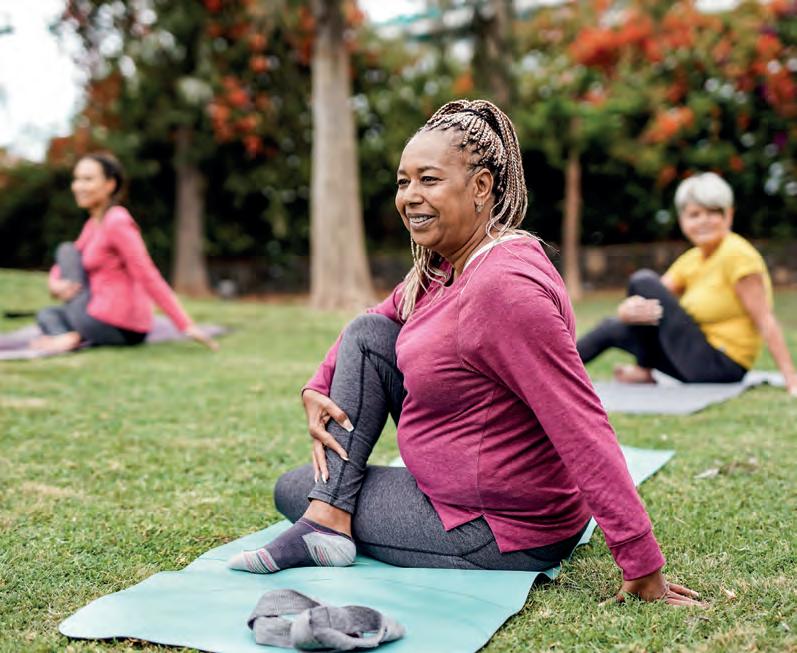
“This part is really about bringing
adult siblings together in a safe space to try some new things and to be with others who share similar experiences,” empathises Clare.
The second element comes in the form of a self-care package sent out to carers, helping them to participate on their own terms and in their own time.
“The final part of the project is at a yoga and mindfulness retreat in January in the Midlands,” reveals Clare. “This is an opportunity for siblings to come together, to talk about some of their experiences of being a sibling carer but also to build connections, to try out yoga, mindfulness and take part in craft activities.
“There’s a real excitement for us as an organisation because the need for this is great and obvious, and we’ve already had some feedback on how necessary this is. Hopefully it’s something that can be replicated in the future for other groups.”
FESTIVE PERIOD
For some people the festive season is a time to relax, re-energise and spend quality time with loved ones, but for carers this can mean reduced support and more responsibilities.
“Holidays and festive occasions can be stressful for families when caring responsibilities don’t go away and often increase as care staff take leave,” stresses Clare.
At this time of year, moments of respite may be limited and hard to find, but they are often more important than the rest of the year due to social care visits being reduced and access to healthcare more sparse. If you are struggling to cope with your caring responsibilities this Christmas, reaching out for support or opening up about how you’re feeling to a trusted person can help relieve this stress.
The majority of carers’ charities keep their helplines open for limited hours over the festive period, or you could get in touch with your local organisation ahead of the Christmas break to discuss any additional support they are providing, or whether they are holding any Christmas events for the person you care for in order to provide respite for carers.
14 enablemagazine.co.uk
The need for this is enormous, some people are providing round the clock care
FOR MORE INFORMATION
For advice and guidance on respite opportunities this winter and into the festive season, speak to Carers UK (www.carers.org) and Carers Trust (www.carers.org.uk)
enable care














ACCESSING BSL CANCER SUPPORT

In March 2022, a survey from Macmillan Cancer Support and YouGov found that one in three people with cancer in the UK, who are also living with hearing loss or deafness, found it harder to access healthcare or treatment due to the coronavirus pandemic. This was 10 per cent higher than for people with cancer who do not have any hearing loss. People with cancer and hearing loss or deafness were also less likely to turn to their family and friends, a cancer charity or an online support group for help than hearing people with cancer.
SHORTAGE
These figures highlighted a gap that already existed: a lack of accessible and inclusive cancer support resources for the d/Deaf/HoH community whether they are receiving a diagnosis, treatment, or supporting a loved one during this time. The coronavirus pandemic brought many of these issues to light: barriers accessing cancer information; a lack of interpreters at some medical appointments; a shortage of cancer information available in British Sign Language (BSL).
In an effort to tackle this inequality and improve support, Macmillan Cancer Support and Self Help UK have collaborated to form new resources. The two organisations have created the Macmillan Deaf Cancer Support Project, offering one-on-one emotional and practical support. Delivered remotely in BSL through trained Deaf volunteers, the new project is a two-year pilot.
The resources will also encompass support for carers, including d/Deaf/ HoH people who are supporting a hearing person with cancer. Virtual peer support groups will be available, but alongside this, the project will provide advocacy support in some complex
cases and will develop a website in BSL, tailored to the needs of d/Deaf/HoH people with cancer.
INPUT
The project has been formulated with input from the d/Deaf/HoH community like Claire Adshead who is part of the Macmillan project team at Self Help UK. Claire has been Deaf since birth and was diagnosed with bowel cancer in 2019, she is now helping to deliver the new service.
“When I saw the surgeon, at the time I didn’t have a BSL interpreter,” highlights Claire. “Luckily, I was able to lipread and understand the surgeon well. I felt I needed more support as I wanted someone to talk to.
“I researched and found no Deaf cancer support groups in my area, only for hearing [people]. In the end I decided to go for one-to-one counselling.”
Claire felt like no-one could empathise with her and had to persevere through
treatment while feeling alone. After finishing treatment, she joined the Macmillan Deaf Cancer Support Group.
“It was lovely to be able talk to another Deaf person going through cancer, sharing their experiences,” offers Claire. “It’s helped me a lot plus it made me feel that I am not alone through my cancer journey as a Deaf person.
“Now I am officially part of the team to do more good work with Deaf people living with cancer.”
As the project begins to deliver essential tailored support, its impact and effectiveness will be formally evaluated through BSL by the Social Research with Deaf people group at the University of Manchester.
FOR MORE INFORMATION
To access support or find out more about the project, visit www.selfhelp.org.uk/ deafcancersupport, or email info@selfhelp.org.uk
16 enablemagazine.co.uk
enable health
Until recently, members of the d/Deaf/HoH community with cancer faced inadequate emotional and practical support, now a new service is creating positive change
SHARING OUR Experiences

LYNN
Lynn had her youngest child, Rachel, 22 years ago. Soon after Rachel was born, Lynn and her husband were told she has Down Syndrome. Lynn has since worked in the charity and campaigning space to change perceptions of the condition.

When I was pregnant with Rachel we didn’t actually have any prenatal testing. I continually question myself so I just decided the chances are very low and we’re not going to do it.


When Rachel was born I had to have an emergency c-section. I previously had three normal pregnancies with no problems and the doctor would joke that I was an expert at it and so it was a bit fraught. When Rachel was born
and I looked at her, I did think to myself she’s got Down Syndrome but I couldn’t really voice it. They took her away and I was left with the midwife, but at that time midwifes weren’t allowed to tell you about these matters so there was just silence.
After a while my husband and I got taken up to a room and a professor came in and introduced himself. He said ‘I’ve got a couple of things that I want to tell you following the birth of your child, the first thing is she’s got some blood problems and we’re going to arrange a transfusion, and the second thing I’m going to tell you might come as a bit of a shock, but I’m pretty sure your child has Down Syndrome’. With my experience now, which is about 22
years later, I know he was useful: he didn’t tell us about his feelings, he didn’t hang his head to one side and say he was sorry or say he had bad news, he was very neutral and actually that was great. We were in an individual room, we were together although Rachel wasn’t there, it was shortly after birth, and I’ve since heard stories where people are told as they’re about to take their child home or over the phone when they’re on their own, so in some ways we actually had quite a good experience.
It wasn’t what we expected and we didn’t really know what it meant for us, but we accepted our child. In the hospital they didn’t have that expertise around Down Syndrome specifically, but we were fortunate enough that we had a good breastfeeding expert on site and she was really supportive to me and I felt she quite often understood how I felt. We had a few weeks while Rachel was still in hospital where we were able to tell people and tell our kids and they were just so accepting. I remember telling my oldest daughter and was quite upset, but when she went to see Rachel she just said ‘oh she’s so cute’. It was such a simple moment but it was so encouraging to me that she didn’t feel any sort of sadness or difference.
18 enablemagazine.co.uk
The way in which people are diagnosed or told about a disability or health condition is incredibly unique. Here, someone living with epilepsy and the parent of a woman with Down Syndrome share their experiences and advice for others
Lynn
It was so encouraging to me that she didn’t feel any sort of sadness or difference
I think we had a very positive experience and unfortunately, people today are still having bad experiences when they’re told that their child has Down Syndrome. For people who are finding out now, I would say don’t despair, these children are amazing and your expectations are set so low at first that you then realise this is no bother and its different, but its good. There are now so many online resources about Down Syndrome and so many people sharing their experiences, so many people you can speak to.
AMANDA
Amanda had her first known seizure during lockdown and was then diagnosed with epilepsy. This changed many aspects in her life, but through practicing mindfulness she now has a positive mindset.


It was the day before my son’s birthday and as normal I went to the bathroom to brush my teeth but that’s all I remember, after that I was in bed and there was two random men in my room which I now know was two ambulance guys. My husband was there and my son was in the hallway and they said they didn’t know what had happened. Afterwards my son said that I didn’t know who he was at the time which was obviously heart-breaking for me to hear because he was so young, he was due to be 11 the next day.

I went into hospital but it was in the middle of lockdown and so I had to go in by myself. I don’t remember most of my time in hospital but I remember being petrified and how reassuring the nurses were. They took me for a brain scan and realised I had a seizure of some sort.

Before my first known seizure I was a paraplanner and I had not long completed all of my training, but when I eventually went back to work I couldn’t remember anything and it was really hard for me to be there. My memory from around the time of my first seizure never returned and new learning took a lot longer than it had done previously. I started having focal seizures and these wiped me out and made me so tired. I knew my career couldn’t progress. After a few months I started to feel better and so I went on the treadmill in the garage, it had been a while since I’d had a seizure but then I had one on the treadmill. It was at that
point I found out I was having tonic clonic seizures. Thankfully, that’s the only ones I’ve had to my knowledge, but I knew I wouldn’t be able to continue at work. I applied for the job with the NHS and I was successful, now I work within a mental health service doing admin.
Even though I’ve been seizure-free for a period of time it’s still always in the back of my mind and I always need to tell someone where I’m going and how I’m getting there. A while ago now I started doing yoga and gradually my whole mindset started to change. Meditation helped me so much and now I run sessions for other people including a weekly meditation slot for all members of staff within my Trust.

My advice would be to take your time, don’t try to rush things like going back to work, and also to be organised. I kept a note of all my funny turns - the wording I use for them - in running order by date and time and noting how I felt afterwards. I also kept all the letters I received from the hospital in date order. I kept these in a folder so they were easy to grab if needed. Finally, advise your family, friends and work colleagues what to do when you have a seizure, and also see if anyone is able to video you during it happening as this is very helpful for your neurologist.

19enablemagazine.co.uk
enable health FOR MORE INFORMATION Visit www.positiveaboutdownsyndrome.co.uk and www.epilepsy.org.uk for support.
Amanda
I
started having focal seizures and these wiped me out and made me so tired

CELEBRATING Dementia heroes
This November, nominations are open for the Dementia Hero Awards, helping to recognise and celebrate people, organisations and charities making a positive difference for people living with dementia
It is thought that there are more than 900,000 people living with dementia in the UK, and this number is expected to increase to more than one million by 2025. Around the country, organisations, charities, researchers and individuals are working with people living with the condition to improve access, inclusion and perceptions.
Until 18 November, nominations are open for the Dementia Hero Awards 2023. The awards focus on celebrating the involvement and participation of people affected by dementia and the impact they have for other people living with the condition. Across nine categories, individuals, groups and organisations making a meaningful impact will be named as dementia heroes.
MEANINGFUL
Nathan Bolton is managing the Dementia Hero Awards and has been working with people living with dementia to plan them.
“So much of managing the project is meaningful involvement of people affected by dementia, so a lot of my time is spent on video calls with people living with dementia or affected by dementia, that could also be carers or family members, just talking to them about the awards,” shares Nathan. “They have helped decide what the categories should look like, the website, the nomination forms.
It’s probably one of the most meaningful projects I get to work on because I spend the majority of my time speaking directly with people affected by dementia.”
In the lead up to the awards, people living with the condition will also be asked for their input on how to make the venue more dementia friendly on the day of the awards.
The Dementia Hero Awards have a rich history and stem from a need to improve and shape society’s ideas of what having dementia is.
“It really came out of a longstanding piece of work which
21enablemagazine.co.uk
enable life
Their lives may change over time, but they are still the same person
started before my time, and that was the Prime Minister’s Champion Group for dementia which started when David Cameron was Prime Minister,” explains Nathan. “The group came together to look at support, at research, and also more day-to-day stuff around the experiences of people living with dementia.”
This group acted as a catalyst for change for people living with dementia in the UK and spurred the awards’ parent organisation, the Alzheimer’s Society, to find new ways to celebrate people making a difference. During the coronavirus pandemic, the focus of the awards shifted.
“People living with dementia were more isolated than they’ve ever been and we decided to change track and in 2021 when we delivered the last set of awards, we really focussed on the fantastic things people have been doing throughout the pandemic to support people affected by dementia,” highlights Nathan. “We really wanted to recognise the things that people have done tirelessly during COVID to support people affected by dementia.”
In 2021 awards were virtual and saw the likes of Paul Harvey being named a dementia hero. Paul, a



composer living with dementia, went viral in 2020 after improvising a song on the spot from just four notes and went on to inspire more than £1 million in donations to Alzheimer’s and dementia charities.
INVOLVED
“This year, we’re still celebrating the best of the best, the most brilliant people in this space, but I think the key differences is that the focus of the awards for 2023 is around the involvement of people affected by dementia,” reveals Nathan. “The best way to get positive outcomes for people living with dementia is to actually involve them directly and so that’s what we will be celebrating.
“The winners will not only have delivered great impacts for people living with the condition, but involved them along the way.”
This year’s categories are wideranging and include Dementia Hero Awards for Outstanding Achievement; Research and Innovation; Dementia Friendly Business; Care and Compassion, and more.
“To deliver the best outcomes for people living with dementia - be that in care or research, or business – you have to involve them,” emphasises Nathan.
NOMINATE
Anyone can nominate their dementia hero using a form on the Alzheimer’s Society website, or people can nominate themselves and their work.
“We’ve created some top tips to make it as easy as possible for people to make their nomination,” explains Nathan. “The key thing that we really want to know from people is what they’ve done whether it’s an activity or a piece of work that you have delivered or someone else has delivered, and what the impact has been for people living with dementia.
“We also want to know how people with dementia have been involved in that piece of work whether it’s been in the planning or delivery, in creating a project and the changes that were made thanks to that input.”
IMPACT
The 2023 Dementia Hero Awards will be an in-person event to celebrate people making a difference for this community, but it is hoped that the impact of highlighting these individuals, businesses and projects will continue past the ceremony itself.
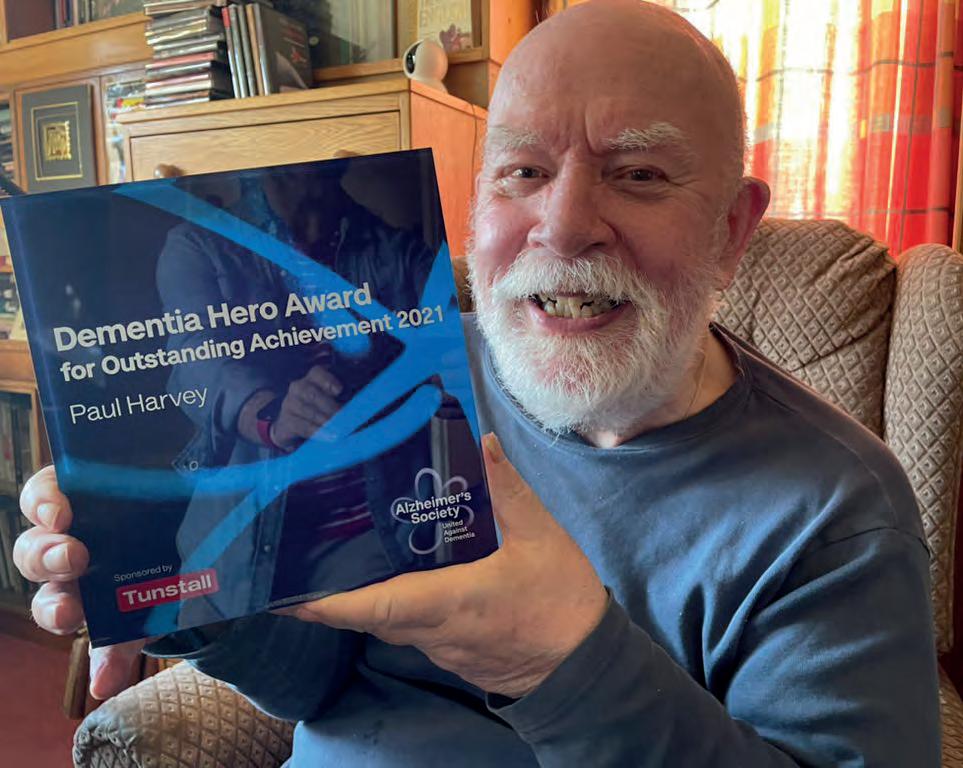
“I think there’s still a lot of work that we need to do in society to change people’s perceptions of dementia, and to help society understand that people affected by the condition still have so much to give,” highlights Nathan. “They have the rest of their lives to lead.
“Their lives may change over time, but they are still the same person and have so much to give.”
“Whether it’s organisations, businesses, individuals out there, we want to see them involve people living with dementia in their work,” adds Nathan. “I hope off the back of the awards we get lots of coverage and recognition of our brilliant winners, but also lots of messages from both people who are looking for support, or from organisations and businesses who want to involve people affected by dementia in their work.”
FOR MORE INFORMATION
To learn more about the Dementia Hero Awards and to nominate your dementia hero, visit www.alzheimers.org.uk
22 enablemagazine.co.uk
Paul Harvey
enable life




















SUPPORTED BY GREENWICH SE10 0BD BOOK YOUR VIEWING AT ONE OF OUR SHOW HOMES TODAY DISCOVER YOUR NEW WHEELCHAIR ADAPTABLE HOME WITH OPTIVO NEW BUILD 1 & 2 BEDROOM SHARED OWNERSHIP APARTMENTS IN LONDON AND BRIGHTON DISCOVER YOUR NEW HOME TODAY OPTIVOSALES.CO.UK/ADAPTABLE | SALES@OPTIVO.ORG.UK | 0800 121 1442 Shared Ownership a�ordability and eligibility criteria apply. Image taken from Home X show home.
Tim Rushby-Smith

Saving lives through training
First Aid courses are very common these days. Certainly, more so than even a few years ago. We have also seen an increase in the prevalence of defibrillators, with units to be found in many public parks, workplaces and sporting venues.
TABOO
When it comes to suicide prevention, there is still some way to go. Suicide is still a taboo subject, and the discussions around assisted dying have also framed much of the debate when it comes to people with a disability. Yet we know that people with a disability are up to four times more likely to attempt to take their own life. We also know that the pressures created by COVID, and now the cost of living increases and energy crisis, will push many people to crisis point. The waves created by suicide or attempted suicide can engulf whole families, social circles, school communities: anyone with a connection to the person in crisis.
As a peer trainer working with others who have a spinal cord injury (SCI), I invest a lot of my energy into helping people to connect and open up in order to encourage honest conversations, especially around mental wellbeing.

INTERVENTION
It’s estimated that up to 11 per cent of people with SCI die through suicide, so when I was presented with the opportunity to train in suicide intervention, I jumped at the chance.
Living Works (www.livingworks. net) Applied Suicide Intervention Skills Training (ASIST)* has been empowering people to provide skilled, life-saving interventions for over 35 years. The course is straightforward, offering insight and developing skills to enable participants to recognise signs of imminent suicide risk, provide a skilled intervention and develop a safety plan to keep someone at risk ‘safe for now’ so that other supports can be explored.
The comparison to first aid is an accurate one in many ways. People often administer first aid to buy time for health care professionals to be able to take over responsibility for the
person with an injury. We can offer a similar lifeline if someone is in mental distress, especially if we are trained to intervene in a way that improves the chances of keeping that person alive. As with physical first aid, the more people we have in the community who are trained to give the right kind of assistance at the right time, the safer we all are.
If you haven’t previously considered undertaking suicide intervention training, I would urge you to do so. It could be one of the most important things you do.
FOR MORE INFORMATION
If this article has raised any concerns for you, call the Samaritans on 116 123
@trushbys.art
enable voices
We know that people with a disability are up to four times more likely to attempt to take their own life
“ “
Our columnist Tim Rushby-Smith discusses the importance of suicide prevention training
24 enablemagazine.co.uk
Follow Tim on social media
on
Twitter @Trushbys and
on Instagram
*OTHER SUICIDE PREVENTION COURSES ARE AVAILABLE.









constantcareandassistancewereslimsoshet urnedtoBrianBarr. SpecialistFibromyalgia,CRPS,ChronicPain&CriticalIllnessLawyers Areyousufferingfollowinganaccidentthatwasn'tyourfault? BrianBarrSolicitorshelpedtosecure£1.5millionincompensationforourclient. Witha97%successrate,BrianBarrareoneofthecountry’smostsuccessfullawfirms forwinningclaimsrelatedtoFibromyalgia,CRPS,seriousandcatastrophicinjuries. Tostartyourclaimgetintouch: call uson 01617379248 DISCOVER THE POSSIBILITIES Össur Touch Solutions have a range of innovative prosthetic hands and digits designed to suit you and your lifestyle, helping you to reclaim your confidence with day to day tasks. Get in touch with our team on 03450 065 065 to see how we can support your journey to a Life Without Limitations. Find out about the new NHS funding available! Scan the QR code WWW.OSSUR.COM HalfPageAd_DiscoverThePossibilities.indd 2 07/10/2022 20:59
EXPLAINING LOSS
Expert advice and support in talking about grief and loss with young people with a learning disability
The death of a loved one is distressing for the whole family, but added pressure can arrive if a parent or carer has to explain this to a child or young person with a learning disability. Reaching out for support from expert organisations and your child’s network can aid this process.
OFFERING SUPPORT

Claire Walsh is a bereavement support practitioner at charity Winston’s Wish, with a specific focus on helping people with special educational needs and disabilities. Her time is spent working one-to-one with children and young people with special educational needs and disabilities to help them understand grief and their feelings around this. This is usually done through fortnightly sessions.
“Having special educational needs or a disability shouldn’t be a barrier to a young person getting bereavement



support,” highlights Claire. “Those sessions can be adapted to be more appropriate for individual needs.









“For example, instead of one hour a fortnight, we can do things like half an hour a week for a young person who might have ADHD and struggles to focus, or it can be that the sessions are adapted using social stories or picture symbols for a young person on the autistic spectrum.”
An important part of the organisation’s work is removing barriers to support for young disabled people and their families who are grieving.
“I think that’s really important because fundamentally, death is a part of all of our lives and children with learning disabilities, autism or additional needs are no different: we all grieve,” emphasises Claire. “It can be confusing for all young people, not just young people with special educational needs and disabilities.”
LANGUAGE

When approaching these conversations with a young person with a learning disability or additional needs, using appropriate and clear language is highly important.
“I think sometimes we try to protect children with the words we use, but one of the things we know is that being honest is really important,” offers Claire. “You should tell them what has happened in a way that is appropriate to their level of understanding. To be clear is to be kind sometimes and you can do it slowly, you don’t have to tell them everything all at once. You can build it up like bits of a jigsaw.”
“I think it’s really important to think about the language that you use,” adds Claire. “You might be tempted to say ‘oh we’ve lost grandma’ but things that are lost can be found and that might confuse the young person.”
Using direct words like dead, dying, death may feel unnatural when speaking to a younger person, but this can avoid confusion as they grieve.

26 enablemagazine.co.uk
“Look at nature and things around you to help your young person or child explore the difference between life and death so that you can help them understand what death means in simple terms,” advises Claire. “Passed away or passed on are the same, it’s not language that young people would usually use and can just lead to confusion. Being really clear on that language is so important.”
Steering away from vague language should stretch further than initial conversations about loss with a child or young person, it should also be considered in the aftermath and as they try to process their feelings.

“Avoid clichés such as ‘you’re so brave’, because they might not be feeling brave at all,” empathises Claire. “Talk about their feelings where you can and acknowledge them, even if they’re not what we might expect them to be feeling.”
REMEMBERING
Finding creative ways to remember the person that has died can help children
and young people understand what has happened and how they’re feeling.
“It is very individual to different children, but a big part of what we do is exploring different strategies that might help them to cope with their grief,” explains Claire. “It’s really important for that young person to remember the person who died, you could look at things that belong to them or share stories and memories of them.
“This gives them an opportunity to learn that its ok to talk about the person who has died and to say their name, because sometimes young people can feel reluctant to do that because they fear upsetting other people.”
Claire also advises creating a memory box with your child or giving them an item that they can hold or look at while they remember the loved one that has died.
NETWORK

Parents and carers aren’t alone during this difficult time: reach out to your child’s support network for help, advice
or to support your own mental health.
“Talk to their school and enlist the help of the school,” advises Claire. “If it’s a child with an education healthcare plan, there may be people involved like the educational psychologist or a teaching assistant or a SENCo, so I would say enlist the help of whoever is around your child.
“It’s really important that you don’t forget national organisations, for example the National Autistic Society, because they have a lot of great resources on bereavement.”
If you don’t have access to a good network of support, organisations like Winston’s Wish or Child Bereavement UK can provide advice and guidance for parents as well as young people themselves.




INFORMATION
after the death of a
To gain
one, contact Winston’s
27enablemagazine.co.uk
To be clear is to be kind sometimes, and you don’t have to do it all at once
enable life
FOR MORE
further advice and information
loved
Wish (www.winstonswish.org) or Child Bereavement UK (www.childbereavementuk.org)
Decoding ME
As we near the end of 2022, people with ME and CFS are being invited to take part in the world’s largest genetic study of the disease
Unlike some other conditions, research around myalgic encephalomyelitis (ME), sometimes known as chronic fatigue syndrome (CFS), is extremely lacking. Now, people with the condition are being invited to take part in the world’s largest study of the disease. Led by researchers at the University of Edinburgh, DecodeME hopes to reveal small differences in a person’s DNA that can increase their risk of developing ME and CFS. Armed with these findings, researchers hope to build a greater understanding of the innerworkings of the disease and assist in the search for effective treatments.
Andy Devereux-Cooke is a management group team member for the study but also lives with ME. Having been involved in the online advocacy world since having to stop work 10 years ago, Andy was brought on board to be a patient representative within the team.
“This patient voice is particularly important for our community that has been disappointed with the lack of research before now,” expresses Andy.
PROCESS
The study is now in the recruitment stage, first asking people living with ME and CFS to fill out a questionnaire with the hopes of then obtaining saliva donations from 25,000 selected people. Of these samples, 5,000 will be from people who have been diagnosed with the condition after having COVID-19.
“While the focus tends naturally to be on the DNA analysis stage, we believe that the questionnaire is going to be extremely valuable because it’s the first time that a survey of this size has been done on any ME and CFS population in the UK,” explains Andy.
After people have been selected to give a sample, saliva kits will be sent to them in the post. These can be completed at home and simply posted back to a processing centre before the genetic testing begins.
“Once all of the data is accumulated, we can start breaking it down, looking for these differences and comparing them to our healthy controls,” highlights Andy.
FINDINGS
Researchers don’t expect to find one single gene playing a role in the risk of someone developing ME and CFS, but instead will be looking for small differences in comparison to a healthy sample set.

“We need the large numbers in order for those differences to show up when we’re comparing them to the healthy control data,” offers Andy. “If you were looking at a forest, we’re not just looking for a few giant red woods above the treeline, we are having to go along to each individual tree and assess it, then compare it to how trees in another
forest might look.
“We hope that we will find evidence for particular triggers or vulnerabilities that can then start being investigated.”
Alongside the opportunity to find these vulnerabilities and then effective treatments, Andy believes there is a secondary benefit to the study.
“I think we’re raising awareness of ME from the study,” he highlights. “Taking part in this big event can mean a lot to people who have maybe felt isolated and ignored before. Speaking personally, particularly from the patient point of view, the additional awareness of ME and CFS and how it affects people can only be a good thing.”
FOR MORE INFORMATION
To fill out the questionnaire or find out more about the study, visit www.decodeme.org.uk
28 enablemagazine.co.uk
enable health
Offering a
to

of




















as usual.


leaks.




complete range
products to help manage bladder weakness, supporting you to live your life
Products for light
heavy urinary
Ranges for men, women and children. Home delivery with discrete packaging. *Terms and conditions apply. Please visit www.iD-Direct.com for more information. Use code Enable20 for 20% off your first order!*Visit www.iD-Direct.com to order now!
BowelTalking conditions


Thanks to people sharing their personal experiences online, awareness of bowel conditions is increasing, but there is still a long way to go before people understand the true impact these can have.
Sarah Sleet works for Crohn’s and Colitis UK, and understands the importance of reducing stigma.
“By understanding how serious this can be, people are able to get themselves healthcare treatment quickly enough to avoid more serious measures down the line,” highlights Sarah. “At the moment as a charity, we’re really trying to promote information around the symptoms of Crohn’s and Colitis and what people should look out for in order to give them the confidence to get help.”
For Crohn’s and Colitis, symptoms can include stomach pain, frequent diarrhoea and blood in stool, but not all have to be present.
“We’re seeing the younger generation using social media as a way to talk about their conditions, to show

stoma bags as part of their treatment, and it’s a very positive thing,” enthuses Sarah. “When you see someone doing that on TikTok or Instagram or anywhere, it can give other people hope.”
SPEAKING UP
Laura has Ehlers-Danlos syndrome (EDS) and due to this, she experiences slow bowel transit, she explains: “It basically means my bowel doesn’t push poo along properly so it can stay in the bowel and get more solid. On top of that, because it was allowed to go on for a long time I formed a pocket in my bowel which is called a rectocele.”
To aid her condition, Laura uses the Qufora from MacGregor Healthcare.
The Qufora is a rectal irrigation product that helps to clear the bowel.
“I use it every day in order to go to the toilet,” highlights Laura. “It helps to push things along and give me consistency.”
For years, Laura has been faced with the stigma that surrounds
conversations around bowel conditions and decided to take action.
“People don’t speak about it but we’re all humans and we have to get rid of waste, for me I need to be talking about these things because I go through these horrendous times with my health and if I don’t speak up then people think you’re living this normal life like everyone else,” expresses Laura. “The poo taboo is still such a big thing, but if I had never spoken up then it really would’ve been a life
30 enablemagazine.co.uk
For people living with di erent conditions a ecting the bowel, open conversations can be the di erence between accessing the right treatment and support or going without essential services
I decided to give an insight into what things can be like at times
From left: Laura in an awareness t-shirt she designed; Laura with her Qufora; Laura with Chloe
or death situation because eventually the pocket that had formed would perforate my bowel.”













DAZZLERS
Laura decided to create an Instagram page dedicated to open and empowering discussion about her condition, calling it @medical_ dazzlers_world: in the medical world, people with rare conditions are often referred to as zebras, and a group of zebras together is called a dazzle.

“I was worried that people would think ‘you look fine so why are you constantly moaning about this?’, so I decided to give an insight into what things can be like at times,” explains Laura. “Why should I feel like I have to keep all of that to myself?
“For myself and for people out there with similar conditions, I wanted to be open and maybe give a little look into what it’s like to have a hidden illness and honestly I didn’t realise how much of a positive impact it would have.”
Laura uses her Instagram to share her experiences and connect with other people who understand her day-to-day life, but she also utilises it as a platform to celebrate other people. Each Saturday she shares a

submitted picture from a follower using #StrongButSuffering, helping to show other people that they’re not alone and that they can reach out for support from someone who understands.
QUFORA TWINS
By connecting with people online, Laura was able to meet Chloe who also uses the Qufora from MacGregor Healthcare.
“I remember Chloe putting a post up of her receiving supplies and thinking ‘my god there’s someone out there using the same things I do, this girl actually does the same as me’,” remembers Laura. “We started talking online and it was like we just aligned, it’s almost like we are the same person but we just live in different places.”
Laura and Chloe gave themselves the nickname the Qufora twins and when MacGregor Healthcare found out, they wanted to help the two women meet face-to-face.


“When you find people who understand and who you can relate to, you almost lean on them a little,” explains Laura. “When I got to meet her it was brilliant but it was also so emotional.
“I actually got to meet someone
in the flesh who could completely relate to what I go through and it was honestly a bit overwhelming. The MacGregor Healthcare team organised everything for us and even got us both hotels so that we could take time to rest if we needed to.”
By sharing her experiences online and connecting with people who understand, Laura is able to see the positives in her every day life, and would encourage other people to speak out to find other people like them. She says: “Just because we’re poorly it doesn’t mean we’ve got to walk about with a sad face all of the time, I always try to get on with things even if it can be really hard sometimes.
“If anyone is struggling I’m always happy for people to reach out and there’s a whole community online now that is open and accepting.”
FOR MORE INFORMATION
For support and information, contact Crohn’s and Colitis UK (www.crohnsandcolitis.org.uk) or Bladder and Bowel UK (www.bladderandbowel.org)
To find out more about the Qufora visit www.macgregorhealthcare.co.uk

31enablemagazine.co.uk
enable life
Imagine the possibilities
Bowel problems, such as faecal incontinence or chronic constipation can put your daily life on hold.
Qufora IrriSedo Flow is a new bowel irrigation system that is easy to use. With innovative features designed for comfort and convenience. It lets you irrigate in the way that suits you and your daily life. Whether that is in your own bathroom or out and about. Manage your bowels on your terms.


Get in touch with us for more information on 0800 612 9090 or at info@macgregorhealthcare.com
´ Comfortable feel
Flow cone with soft, round flexible tip


´ Light-weight
Pump that is easy to hold and squeeze
´ Adjust the flow
So that the water flow feels right for you
Distributed by MacGregor Healthcare Ltd Tel 0800 612 90 90
Mail info@macgregorhealthcare.com Web www.macgregorhealthcare.com
Qufora® is a registered trademark of Qufora A/S. ©06/2022. All rights reserved Qufora A/S, 3450 Allerød, Denmark.

-
-
-
THROUGH THE COST OF LIVING CRISIS
This winter will be particularly hard for people with a disability. Understanding what help is available can help you access food and pay for energy bills
For many households throughout the UK, this winter will present new challenges in paying for food, heating and other essentials, but for disabled households difficulty keeping up with the rising cost of living could be

In the community
catastrophic. Alongside financial support announced by the UK Government, there are other ways you can make changes or reach out for help. It is always helpful to contact disability-specific charities to find out what tailored support may be on offer from them or associated organisations.
All communities have support available if you are struggling to buy food for yourself or your family. In most cases, this support will come in the form of help from a food bank. If you need this, contact your local authority (www.gov. uk) who will be able to refer you to a food bank. They might ask you some questions about your situation and who you support in the home. You can also get a referral from Citizens Advice by calling their helpline on 0808 223 113. After you have a referral, you will receive a voucher which you take to your local food bank centre. If you need food in an emergency, get in touch with your closest food bank directly and they will be able to help.
If you are trying to cut costs this winter in order to afford essentials like heating and food, it can be hard to explain this to young children if they are used to attending different activities. Using a quick search, you can find
free activities and clubs in your area for children of different ages. Families Online (www.familiesonline.co.uk), Club Hub (www.clubhubuk.co.uk) and End Child Food Poverty (www. endchildfoodpoverty.org) all have ways for you to find clubs, activities and holiday clubs which provide free meals for children and young people. Free holiday club places are usually available for children who receive free school meals, but they also run fun activities throughout the day within a safe and secure environment.
If you can’t find free activities through these organisations, contact your local authority to find out about council-run spaces and clubs that young people can attend.
Support and advice
During September 2022, the Joseph Rowantree Foundation’s UK Poverty Profile revealed that around 14.5 million people in the UK are living in
poverty. This is expected to worsen over the winter as people struggle to afford everyday costs like heating, food and fuel, as well as essential prescriptions and care. It is normal to feel helpless and concerned at this time, and if you do, speaking to an expert can reassure you or help you form a plan for the upcoming season.
Disability charity Sense (www.sense. org.uk) have an information page highlighting support, and Turn2Us (www.turn2us.org.uk) have a frequently asked questions page covering benefits, fuel payments and any financial support that has been announced by the UK Government.
If rising costs are having an impact on your mental health, you can call the Samaritans (www.samaritans.org) at any time of day by dialling 116 123.
In response to the cost of living crisis, Mental Health & Money Advice (www. mentalhealthandmoneyadvice.org) have launched a dedicated hub, providing information, tips and advice, and signposting to helpful organisations.
33enablemagazine.co.uk
SUPPORT
enable finance
Heating your home
Ensuring your home is heated is essential if you have children or if someone in your household lives with a disability or long-term health condition which is affected by the cold. This can cause extra strain financially, especially after the new price cap came into force during October 2022. There is some financial support available for people who have high energy bills, understanding what you’re entitled to can help.
From October 2022, all households in the UK should have started to receive instalments of a £400 energy discount. If you pay by direct debit, this will be applied to your energy bill automatically each month in payments of £66 or £67, and if you pay a different way you should have been notified on how you will receive this by your energy provider.

This year, older people who are in receipt of the Winter Fuel Payment will also receive an extra payment. The Winter Fuel Payment is available for people who were born on or before 25 September 1956, and who lived in the UK for at least one day during the week commencing 19 September 2022.
People who fit these criteria but have
been in hospital receiving treatment for more than a year; lived in a care home for this week; or receive Pension Credit, Income Support, income-based Jobseeker’s Allowance (JSA) or incomebased Employment and Support Allowance (ESA), will not receive the additional funding.
How much you will get depends on your circumstances and age, but during winter 2022/23, this group will also receive a Pensioner Cost of Living Payment of between £150 and £300. You do not need to apply for the Winter Fuel Payment, if you are eligible you will be enrolled automatically.
People who are in receipt of the excluded benefits may still get additional support to help with energy bills and
heating this winter. Households receiving Universal Credit, income-related ESA or JSA, Housing Benefits, Working Tax Credit, Child Tax Credit or Savings Pension Credit could also get £150 off their energy bills. If you are in receipt of these benefits, your energy company will assess whether you have high energy needs and if you qualify for this support. If you don’t receive this and think you should, contact your energy provider directly.
Over the last year, the criteria for the Warm Homes grant will mean that many people claiming disability benefits will no longer receive this financial support. You now need to have high energy bills and be eligible for a qualifying means-tested benefit. Like the Winter Fuel Payment, you no longer have to apply for this money, but will be automatically enrolled if you are eligible.
FOR MORE INFORMATION
If you are worried about your situation or would like advice for the future, Citizens Advice (www.citizensadvice.org.uk, 0808 223 113) and Money Helper (www.moneyhelper.org.uk, 0800 138 7777) can both offer support.
34 enablemagazine.co.uk
enable finance
Speaking to an expert can reassure you or help you form a plan




Created by In partnership with An exclusive collection of one bedroom, fully accessible, riverside apartments DESIGNED IN PARTNERSHIP WITH ROYAL BOTANIC GARDENS, KEW DEDICATED 24 HOUR CONCIERGE 0204 5796 228 SCAN TO FIND OUT MORE Enable Magazine 190x137-5mm.indd 1 17/06/2022 13:10
IDENTIFYING scams
Since the beginning of the coronavirus pandemic in March 2020, there has been a surge in online fraud and other scams. In 2021, UK victims of scams lost more than £1.3 billion. As scams become more sophisticated, they can be hard to spot: if you fall victim to a scam you shouldn’t be embarrassed, but quickly seek help and support. Knowing who to contact if this happens, and what to look out for, can help.
COST OF LIVING
From October 2022, households across the UK began to receive instalments of the £400 cost of living energy payment from the Government as part of the Energy Bills Support Scheme. Given in six payments until March 2023, the support is much-needed, but scams related to the payment have already been reported. This money should be applied automatically to your bill by your energy provider and in the majority of cases, they won’t contact you to discuss or confirm this. Remember, you will never be asked for your bank details or any other personal information in order to receive this money.
PENSIONS
With the rising cost of living and ever-changing interest rates, its normal to feel worried about your future finances and especially your pension pot. Pension scams are continually on the rise and some of these are sophisticated and hard to spot. You could be approached through email, text, or by phone call: checking the email address or number contacting you against your pension provider is a good first step, but you should never normally receive a cold call from your pension provider. If you’re worried that any correspondence isn’t legitimate, look for contact
details on a letter you have previously received from your provider or via their website. They can then confirm whether they were trying to contact you and if so, why.
REPORTING SCAMS
If you believe you have received a text, email or call that could be a scam, reporting it can mean other people are less likely to receive this in the future. You can report a scam you have been victim to before or after you seek support from a relevant organisation.
Regardless of how you have been contacted by a fraudulent organisation, you should report this to Action Fraud, the UK’s national reporting centre for fraud. You can report a scam online at actionfraud. police.uk, or call on 0300 123 2040.
If you are worried about a financial scam, call the Stop Scams UK (www. stopscamsuk.org.uk) phone service by dialling 159. This number is backed by UK banks and technology firms to make it easier to access advice and support. You can also contact your bank directly to see what help they can offer, especially if you have lost money due to a scam. Always find direct contact details using online or mobile banking, or go in branch.
36 enablemagazine.co.uk
Scams are becoming harder to spot whether they are online, via email, text or call. Understanding who to contact if this happens is key to ensuring you don’t lose money and can access support
enable finance
FOR MORE INFORMATION Citizens Advice (www.citizensadvice.org.uk) provide an online form and helpline (0808 223 1133, dial 18001 first if using Relay UK), where you can report a scam and access advice.












































































































































































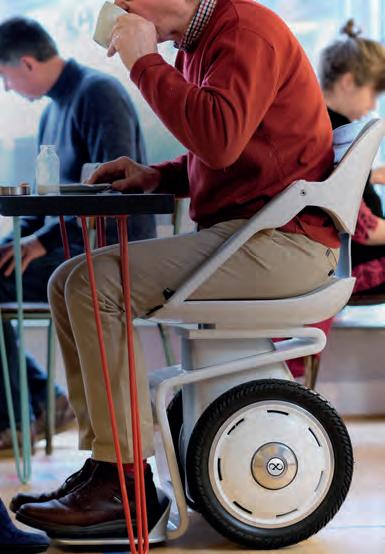
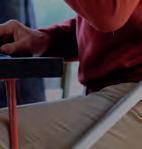














C M Y CM MY CY CMY K MOTIVATIONTHROUGHINNOVATION Strident Innovations Head office address: 50 Turbine Way Ecotech Business & Innovation Park, Swaffham PE37 7XD www.strident.uk.com 01362 300102 or email us at sales@strident uk com Strident - a name you can trust for battery power Supplying high performing batter y power for mobility scooters, powerchairs, stairlifts, bath lifts, hoists and more for over 20 years, Strident batteries support your freedom and mobility taking you the extra mile. Ask your distributor for further advise on the Strident brand of products or contact us to find your nearest installer STRIDENT ENABLE BATTERY ADVERT DEC 2021_Layout 1 07/12/2021 10:49 self-balancing powerchair Introducing TheCentaur Discovertherevolutionary Centaur here: www.centaurrobotics.com/enable Theslimtwo-wheeledCentaur fitsintothespaceofadining chairandraisesyoutoeye-level. Elegant,affordable andcompact. CENT20220526-HalfPageEnableAdFINAL.indd1 10/06/202216:02
Preparing for
CHRISTMAS
Christmas can be a magical time to connect with your friends and family, spend quality time with loved ones and look forward to a new year. For some autistic children, young people and adults, the changes that take place over the festive season might feel overwhelming. From talking about what to expect to deciding whether to wrap presents and when to decorate, planning ahead can ease their anxieties. Sarah Rixon, who works in the children and family service at Autism Together, is sharing her tips ahead of this Christmas.
Finding solutions and easing pressure
Christmas can be a really stressful time because there’s lots of changes and when someone is on the spectrum that can cause all sorts of disruptions in their life. One of the things to remember is that people might find it hard to communicate or may need their own ways of communicating. With that in mind, try to remember where someone’s feelings are coming from and the reasons why, it can make us more understanding, but we can also put solutions in place before things get to that point so that they react better.
A lot of the concerns come from worrying that this person isn’t going to enjoy Christmas. There is a lot of pressure around Christmas and people can compare themselves to others, you might want to celebrate like everyone else and sometimes that’s not possible. Parents already have a lot of stress to deal with during this time and you don’t want to reach breaking point, when there’s a big event like this you
have to stop comparing yourself to what you see on places like Instagram or pictures of other families who seem to be having this perfect time. It can be stressful for the whole family with changes to food, decorations, school, more visitors coming into the house. All of this stuff completely changes the regular routine for families.
These big changes can cause big feelings and there’s different ways you can plan and prepare to make it easier. Using picture planning or social stories can break down exactly what’s going to happen at Christmas, what the changes are and how to cope with it. There are different things you can do in the home to ease into it: for example, if you’re putting the tree up one day then maybe don’t put the decorations up until the next day or a few days later and just take it one step at a time. You could have safe spaces in the home where nothing has changed, they offer a chance to have some normalcy and quiet.
As the festive season begins, an expert shares their tips for autistic adults and families with an autistic child
38 enablemagazine.co.uk
Managing expectations and visiting family
Everyone has their own expectations for the festive season and that’s ok, but it’s about managing those expectations and being prepared. All autistic children and young people will react differently and can be overwhelmed by different things. Always try to reassure them that you’re there to help, especially if they find it hard to express their feelings. Giving them knowledge of what’s going to happen and some structure can help them work through those feelings in the lead up. As parents, we often have this expectation that everything is going to be perfect, and for example, if the neighbour gives your child a present they’re immediately going to say thank you very much, but it’s ok if things are different and you can actually speak to the people around you ahead of time to let them know what to expect. It’s also ok to spend Christmas with just your small family group instead of going to a big gathering, it can mean you don’t have to rush, your child can take their time
and you can all enjoy the day more. If you are going to be visiting family over this time, ask them if there’s a quiet space where your child can go if they need to, check what food will be on offer ahead of time so that you can explain that or take a packed lunch if you need to. If you are meeting friends and family during the festive period, try to do something like an outside walk so that your child can have their own space when they need it.
We get so stressed thinking that we have to have a typical, cookie-cutter Christmas, when really you have to do what works for your family. I think that’s actually a really nice thing: you get the chance to make your own family traditions at Christmas which just makes it even more special. You can ask your young person what they would like for a present and discuss whether they want their presents wrapped or not, or maybe they could have one present wrapped and the rest unwrapped.
ADVICE AND SUPPORT
If you or your child are worried in the lead up to Christmas, or you’re finding it hard to prepare, autismspecific organisations and charities can offer essential advice to help.
Autism Together www.autismtogether.co.uk 0151 334 7510
National Autistic Society www.autism.org.uk
Ambitious About Autism www.ambitiousaboutautism.org.uk forum.ambitiousaboutautism.org.uk
39enablemagazine.co.uk
enable life


COMPANIONSHIP Finding this Christmas
Social isolation and feelings of loneliness can be an issue all year round, but the number of people experiencing this during the winter months is especially concerning. In December 2021, around twice as many disabled people reported feeling lonely often, always or some of the time in comparison to non-disabled people.
Feelings of loneliness can come whether you are by yourself or with other people, and during the festive period it can be especially difficult to see others enjoying themselves or surrounded by family and friends. You may also be feeling pressure to socialise when you don’t want to. During this time, charities are at hand to offer companionship, support and to help you form connections with people who feel the same way.
Organisations including the Campaign to End Loneliness (www. campaigntoendloneliness.org), Age UK (www.ageuk.org.uk) and Mencap (www. mencap.org.uk) run annual Christmas campaigns, offering tailored support and highlighting the different resources people can access at this sometimes difficult time of year.
Mental health charities can also be of great support if you are feeling lonely during the festive season. The Samaritans (www. samaritans.org, 116 123), SANEline (www. sane.org.uk, 0300 304 7000) and Shout (www.giveusashout.org, text SHOUT to 85258), all provide impartial support and advice if you are experiencing mental health problems.

CHRISTMAS DINNER
Preparing a traditional Christmas dinner is not only a large expense, but it can be challenging if you don’t normally cook for yourself or need certain adaptations in the kitchen. This winter, the Salvation Army (www.salvationarmy.org.uk) are supporting people through providing Christmas
lunches for older people living alone; giving Christmas food parcels to families who are struggling to afford this; distributing toys to children whose parents are unable to afford them this Christmas.
Some local food banks and community groups will also be holding Christmas lunches or distributing Christmas food parcels to individuals and families. If you already use a food bank or receive other meal support in your area, ask what they are providing during the festive season and if you are able to receive support.
GIVING BACK
Spending time in the community can help combat loneliness, but it is also a chance to give back if you are able to. During the festive period, places like food banks, community centres and charities often need additional volunteers to meet increased demand for their services. You could even volunteer somewhere you have received support in the past. Find opportunities with Volunteering Matters (www. volunteeringmatters.org.uk).
FOR MORE INFORMATION
Speak to disability-specific and local charities to see what support they are offering this Christmas.
enable life
41enablemagazine.co.uk
Feelings of loneliness can come whether you are by yourself or with other people
Over the festive period, feelings of isolation and loneliness can be overwhelming, but there is support available to help during Christmas and throughout the winter
Mark the festive season in style this year with a hamper filled with delicious treats. We’re giving three readers the chance to win a Night Before Christmas hamper from Regency Hampers. Inside this seasonal box, you’ll find a selection of sweet and savoury snacks to share or enjoy by yourself.
Take time out of your day for a mid-afternoon snack and settle down with Arden’s Tomato and Basil Puff Pastry Twists or some Basil and Mozzarella Crisps from Yorkshire Crisps. Pair your nibbles with a cup of English Breakfast Tea from New English Teas or an After Dinner Coffee from Edinburgh Tea and Coffee Company which are also included.
For readers with a sweet tooth, there’s plenty to choose from. Chocolate lovers can indulge in a box of Lindt Mini Pralines, or keep it traditional and treat yourself to a Luxury Mince Pie from The Cotswold Gourmet and a piece of Cotswold Luxury Shortbread from Four Anjels.

All of these delicious items will arrive in a festive package, helping you to celebrate in the lead up to Christmas and the new year.
TERMS AND CONDITIONS:
The publisher’s decision is
A CHRISTMAS HAMPER
WIN
All entries must be received by Wednesday 14 December 2022. The prize is one Night Before Christmas Gift Carton which will be sent to the winner. The contents of the prize may differ from the images and descriptions included here. The prize in non-transferable, non-refundable, there is no cash alternative and cannot be sold to another party. The competition is not associated with Regency Hampers. One entry per household.
final. enable competition This issue, we’re giving three readers the chance to win a Night Before Christmas hamper 42 enablemagazine.co.uk FILLED WITH FESTIVE TREATS HOW TO ENTER To be in with the chance of winning this prize, simply send us your name, contact details and where you picked up your copy of Enable to competitions@dcpublishing.co.uk quoting Christmas Hamper 2022. Or visit the Enable website and enter online at: www.enablemagazine.co.uk/christmashamper22 All entries must be received by Wednesday 14 December 2022. Good luck! PIC: © REGENCY HAMPERS



























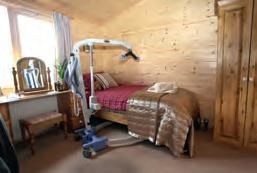
Denis Duncan House Leuchie’s fully accessible, self-catering holiday home in Dirleton, East Lothian. To find out more and book, visit denisduncanhouse.co.uk Speak to Jo or Katy to book on 01620 892864 leuchiehouse.org.uk Tailored short breaks with 24 hr nursing care Leuchie is a charity registered in Scotland no SC042249 50% funding available on certain dates @LakesideHub @BrickHCottages Lakeside_Hub BrickHCottages Based in Lancashire within 6 acres of countryside Electric track hoists in all cottages from bedroom to wet room & profile beds available All overlooking our private fishing lake Luxury hot tubs with track hoist in 9 of 12 Additional equipment to make your stay a home from home Private hire of Hydrotherapy pool & Interactive sensory room Fully equipped Changing Place Toilet www.brickhousecottages.co.uk info@brickhousecottages.co.uk / 01253 702 122 / Brickhouse Lane, Hambleton, FY6 9BG AccessibleHolidayCottages with onsite accessible facilities; hydrotherapy pool, sensory room & bistro £40 off code: Enable40 - Jan - Mar '23 EscapewithConfidence,HolidaywithFreedom • Semi-rural location 20 minutes from the spectacular Jurassic Coastline and Poole Harbour • Sleeps 6 • Wheelchair accessible ground-floor with wheel-in wet room • Electric profiling bed • Adapted kitchen • Variety of mobility aids provided, on request, including self-propelling shower-chair • Dogs welcome Hill Lodge Accessible Self-Catering Accommodation, Poole, Dorset Contact: Tel: 01202 630075 becky@endeavour-uk.co.uk www.endeavour-uk.co.uk Rollinwetroomshower Off-roadwheelchairhire Staysomewherespecial Wheelchairaccessible Self-cateringlogcabins inthePeakDistrictcountryside Mobilehoist Specialistequipment www.hoegrangeholidays.co.uk tel:01629540262
THE AUTISM FRIENDLY COOKBOOK
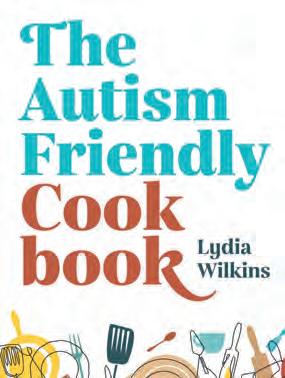
Meet the author
What made you want to write the Autism Friendly Cookbook?
I hadn’t actually intended to write a book, it just kind of happened. I had a Personal Independence Claim early on in the pandemic and I knew the system was bad, but they came back and said no I could simply learn how to cook. It seemed completely ridiculous to me, then when I was talking to autistic friends and other individuals I found that we all had the same experience in the kitchen but there wasn’t any kind of resource to help.
I was having so many different conversations and it just came together, we knew about the problem areas and what needed addressing, how recipes had failed us previously.
The book is split into two different sections, why was this important?
The first part of the book is filled with information for parents, guardians, teachers, carers, and the second part is filled with more than 100 recipes. I interviewed a lot of autistic people who gave their own recipes for this book, it’s not just me it’s actually around 30 autistic people about their experiences and what they need help with in the kitchen. I reached out to people I know and on social media and the response was actually quite overwhelming. I had to chase everything up and make sure the recipes would work, pick what would make it in the book and what wouldn’t. For my own recipes, if I had gone out for a particular meal with friends I would take inspiration from that, meanwhile I would be interviewing
the other people and that’s really how the recipes came together. I had to co-ordinate with Emily who does the illustrations for the book and that was really the final stage.
What was it like receiving the final book?
It was absolutely mad. I had to turn in 80,000 words for the book and you don’t really know what that will look like. The finished book is nearly 400 pages long which was completely mad to receive.
Why is it so important to have an autism friendly cookbook?
It’s important for a lot of reasons, some of them are long-term: the lack of access to food and to using the kitchen can translate into having an unhealthy diet which then causes other problems.
It shouldn’t be surprising, but it is quite shocking when you talk to autistic individuals who are expressing what they need but just don’t have access. In society, we have this strange idea that autistic people are often picky eaters and therefore we have to conform to
set standards, but it could be about texture for example rather than only liking particular foods. Rather than having this limiting idea of what an autistic person should and shouldn’t do, I think we should take an approach where they lead and get to express what they want and need.
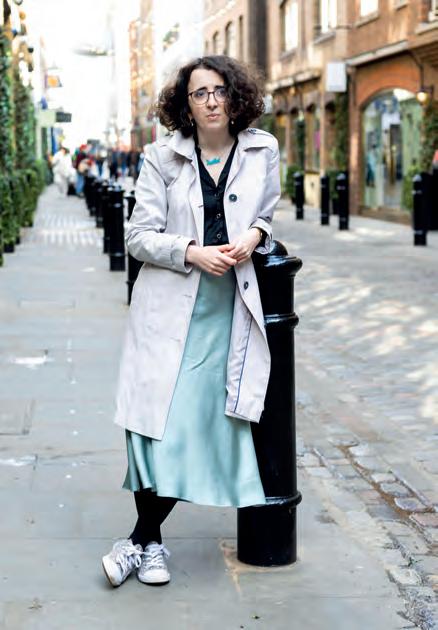
44 enablemagazine.co.uk
The Autism Friendly Cookbook is published by Jessica Kingsley Publishers and is available from 21 November 2022. Use code AUTBOOKEN20 for 20 per cent off your purchase at uk.jkp.com
We meet the author behind The Autism Friendly Cookbook, Lydia Wilkins, and share one of her favourite recipes from inside
We all had the same experience in the kitchen but there wasn't any kind of resource to help
PIC: © SHONA LOUISE PHOTOGRAPHY
MOTHER’S
NACHOS
DURATION: 20 minutes
ENERGY RATING: Moderate
SKILL LEVEL: Medium
EQUIPMENT YOU WILL NEED
2 small bowls
2 baking trays
1 grater
1 chopping board
2 chopping knives
1 fork
2 tablespoons (for stirring the guacamole and the salsa)
1 plate for serving
INGREDIENTS
1 avocado
1 red onion
1 packet of tortilla chips
1 packet of cheese (enough to grate a handful)
1 small bunch of coriander/ cilantro
1 small bunch of basil
2 small handfuls of cherry tomatoes
1 bottle of sweet chilli sauce (just a little is needed for the guacamole)
1 bottle of tomato sauce (just a small amount is used)
Optional: 1 jar of smoked paprika
STEPS
Scoop the insides of the avocado into a small bowl and set aside. Chop the onion up thinly and set aside in a separate bowl. Spread the tortilla chips out across the 2 baking trays. Grate a handful of cheese. Finely chop the coriander and the basil, and set aside for later. And,

finally, chop up the tomatoes.
1. Set your oven to 180°C/350° and allow it to heat up. After about 5 minutes, put in the trays with the nacho crisps on them; this is just to warm them up.
2. While this is happening, we will be making guacamole and salsa, to add on top of the nacho crisps – rather than using a pre-prepared sauce. First up, the guacamole. Mash the avocado with the fork, and add a dash of the sweet chilli sauce to the bowl. Stir until combined to create a sauce-like texture.
3. For the salsa, combine the onion, half of the chopped-up tomatoes, and add a small amount of tomato sauce. Stir until combined. Add the coriander and basil and stir again. (As an option here, I sometimes like to add a pinch of smoked paprika.)
4. Take the nacho crisps out of the oven briefly. Spread the guacamole and the salsa on top; sprinkle the handful of cheese across both trays, and top with the remaining cherry tomatoes. Put back in the oven until the cheese melts.
EXPAND YOUR REPERTOIRE
If you feel brave, you could consider adding a small amount of finely chopped fresh chillies to the salsa; make sure you remove the seeds. Any packaging will provide guidance on how hot the chillies are; be cautious. If onions make you cry, or you want less of the burning tang while eating, sometimes soaking them in room-temperature water is said to help take out the sting. Just factor this into when you make the recipe, and be warned that the feel of the onion may not be pleasant when handling it while making the salsa. Spices are always worth experimenting with as well, and personal preference can be formulated by individual sensory profiles. For example, you could try using black pepper to flavour the nachos – or, if you are an sensory avoider, using only salt may be the way to go.
45enablemagazine.co.uk
SUNDAY AFTERNOON
RECIPE enable life
PIC: ©EMILY AT @21ANDSENSORY
WINTER ENTERTAINMENT
Fill your time with our pick of books, podcasts and what's on screen this season
BOOKS
Available in print, e-book and audiobook.
The Light We Carry Michelle Obama www.penguin.co.uk

In the latest book from the former First Lady, Michelle Obama shares her strategies for staying hopeful and balanced in an uncertain world. Covering topics like relationships, community and feeling like things are too much, Michelle addresses questions that will help people cope better with change while remaining humorous and optimistic.
Apples Never Fall
Liane Moriarty
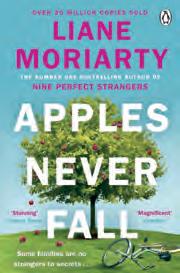
www.penguin.co.uk
Author of renowned titles including Nine Perfect Strangers and Big Little Lies, Liane Moriarty’s latest release centres around a tennisobsessed family headed by parents and tennis marvels Joy and Stan. After the couple make the decision to retire, a mysterious stranger appears on their doorstop asking for help. Joy quickly goes missing and as the whole family is interviewed, family secrets and troubles come to light.
PODCASTS




Listen via your chosen podcast platform.
The Bunker

Available on all regular podcast platforms
If you’re struggling to keep up with the goings-on of UK politics lately, you’re not alone and this podcast can help.
This daily, 30-minute podcast covers politics and culture, calling on members of the media and experts to inform discussions about current events.
Breaking it down: Sex and MS www.mstrust.org.uk
The Breaking it down podcast from the MS Trust brings together voices from this community to cover all aspects of life with multiple sclerosis.

In a multi-episode series, experts and people living with MS discuss sex and sexual health, and share tips for having more open conversations about sex and MS.
The Happiness Lab with Dr. Laurie Santos www.pushkin.fm

This podcast with Yale university professor



Dr. Laurie Santos debunks the idea that you need the perfect job, holidays or lots of money to be happy. Each episode tackles common misconceptions in an easy to digest format, backing discussions up with scientific research.
ON SCREEN
Grab your favourite snacks and relax.
Ralph & Katie
Six part series
BBC One
This new BBC series follows the first year of marriage for young couple Ralph and Katie who both have Down’s Syndrome. Made up of six 30-minute episodes, the series is a spin-off from the hit drama The A Word, and will follow the couple as they navigate life as newlyweds and face a new set of challenges.

Avatar: The Way of Water Cinemas nationwide
After being pushed back by a year due to the coronavirus pandemic, the sequel to Avatar will be released in cinemas on 16 December 2022. The second instalment comes 13 years after the first movie was released and will continue to follow the two main characters, Jake Sully and Ney’tiri as they fight a new war against the humans.

enable life
46 enablemagazine.co.uk
We believe if
Rehab.
have to do something everyday, you should at least enjoy it.
GripAble turns daily training and exercises for weakened hands and arms into fun, accessible, engaging and measurable activities.

ONGOING SUPPORT 5 MINUTES SET UP
you
WWW.GRIPABLE.CO HELLO@GRIPABLE.CO DELIVERY IN 24 HRS PLAYING MAKES PERFECT BUY OR RENT NOW at www.gripable.co/enable
TALKING MEDIA REPRESENTATION With Jordan Jarrett-Bryan
Disability visibility in the media and creative industries is improving, but in 2022 this is still not proportionate to the number of disabled people in society.
Each year, Diamond - an online system used by major broadcasters to obtain consistent diversity data on the programmes they commission – publish reports on contributions by individuals working on and off-screen in TV. The Fifth Cut: Diamond at 5 was published in 2021, covering content from the BBC, Channel 4, ITV, Paramount and Sky. This latest iteration of data showed that just six per cent of off-screen and 8.3 per cent of on-screen contributions were made by disabled people. These figures are concerningly low in comparison to the 22 per cent of the
population with a disability.
Former wheelchair basketball player and now reporter, Jordan Jarrett-Bryan, has seen representation increase over the last decade, but this hasn’t gone far enough.
PROGRESSION
“If I had to put it in a timeframe, I think the 2012 Paralympics were a massive gamechanger, not just nationally but globally,” expresses Jordan. “Looking beyond sports, we have seen far more disabled comedians, presenters.

“I will say however, I think that disability is still the last group to really get anywhere near the kind of visible representation we should have – we’re seeing more Black people on TV, more women, more people from the LGBTQ+ community, even more people from
different regions. I still feel like disabled people are back of the queue in terms of representation in the media.”
Change begins with acknowledging how unique people’s experiences and needs are.
As an amputee who has a prosthetic leg, Jordan acknowledges that his experience of bias in the media will be different than other disabled people’s.
“I don’t have anyone looking at me and thinking about the things that I can’t do in the same way as somebody that needs a walking stick or who uses a hearing aid,” highlights Jordan. “I’m very conscious that when I talk about being disabled in the media and in the workplace, my experience is very different to my colleagues and peers who have a more visible disability.”
UNDERSTANDING
In order to improve the way disability is shown on screen, and how people are included behind the scenes, there first needs to be more understanding.
“It still astonishes me when I go to studios and they don’t have doorways that are wide enough to accommodate wheelchairs, or they haven’t factored in how to get someone outside quickly if there’s a fire,” shares Jordan. “This is stuff that was being discussed 20 years ago and has still not improved.
“I think it should be embedded into what channels are doing.”
Without a greater effort from production companies, studios and broadcasters, Jordan is concerned that young disabled people will be discouraged from pursuing a career in the industry.
“People that have a disability could be discouraged or disheartened from a career in journalism or the media, but
48 enablemagazine.co.uk
Over the last five years, the number of disabled people on our screens has increased, but is enough being done to represented disabled people behind and in front of the camera?
PICS: © ANDY COMMONS
this is an industry that should want to hear what you have to say,” stresses Jordan. “It’s an industry that deserves us and needs us.”
FUTURE
What needs to change can’t be reduced to one action or statement: it has to improve things for people with a range of disabilities and health conditions and take their differing needs into account.
“I think representation will be where it is supposed to be when people have an industry space that’s for them, when what they are watching, reading, listening to - be it on a podcast, radio, TV or in print – feels like they are represented,” shares Jordan. “It’s never going to be perfect in everything, but as long as it feels like there is a balance.”
The discussion around representation stretches further than disability: intersectionality has to be considered too.
“Just because someone has a
disability, that is not an identifier, that is not their personality, and we also have to consider that someone who is a white woman and disabled is going to have a very different experience in the workplace and in the media than a man who is Black and disabled,” emphasises Jordan. “I’m a big believer that educating young people can create a better world. If we can get to them before they take on negative perceptions then the future will be better – they then understand that people are different and need to be respected.”
Input from disabled people and other marginalised groups is essential to creating a more inclusive industry onscreen and behind the scenes, but when these opportunities don’t exist, Jordan would encourage people to create their own. When he was frustrated with the lack of Black representation on screen, Jordan launched Blakademik (www. blakademik.com), a platform created

to elevate and celebrate Black culture through shows and other content.
“I’m looking to infiltrate the industry from the outside, there’s people doing great work on the inside, but there’s a lot of faults as well,” advises Jordan. “Especially for young people now, you can be your own producer or director or writer, you don’t have to wait for something to be commissioned.
“People might try to convince you otherwise but don’t let them. We need to start creating our own opportunities instead of waiting for representation.”
People are becoming more aware of the need to be inclusive and consult the communities this affects, but more has to be done before people feel truly represented in the media.
49enablemagazine.co.uk
enable life
FOR MORE INFORMATION
Follow Jordan on social media @jordanjarretbryan
We need to start creating our own opportunities































LOOK GOOD. FEEL GOOD. ADAPTIVE WEAR FOR MODERN LIFE Love the initiative to create clothing suited for wheelchair users. It’s great that the joggers fit properly around my legs and ankles, unlike some un-adapted ones. The fit on the waist is good, they are really great quality too! Karé Adenegan, Paralympian Slim fit joggers that aren’t impossible to get on! As clothes are usually designed for standing, the fit isn’t always ideal for us wheelchair users but these were a great fit and super easy to get on! George, @thewheellife_ • Zips for easy catheterising • Soft material • Handy pocket • Flexible ankle cuffs to suit most foot positions • Slim and regular fit to suit all body types • Higher back to ensure full coverage while sitting and transferring Bealies joggers with code Enable10
7-11 NOVEMBER
TALK MONEY WEEK Nationwide www.moneyhelper.org.uk
Every year, Talk Money Week encourages people to be more open about their finances with those around them, and to get help from experts if necessary. This year, the awareness campaign is more important as costs continue to rise. As the week approaches, you can be part of starting positive conversations about money and removing the taboo of talking openly about your finances.
DECEMBER
3 DECEMBER
IDPWD Worldwide www.idpwd.org
As the annual International Day of People with Disabilities (IDPWD) approaches, the spotlight is on the inclusion of disabled people in societies around the world. The global event, which is observed by the United Nations, will turn 30 this year, continuing to highlight the need for action and education around disability access around the world.
9 DECEMBER
SANTA’S QUIET GROTTO Selected Dobbies throughout the UK events.dobbies.com

Take your little ones on a visit to meet Santa this winter at your closest Dobbies Garden Centre. Santa’s Quiet Grotto has been created for children with additional needs and will take place in 10-minute slots after 2:30pm on 9 December.
During your visit, all music will be off, twinkling lights are switched off or removed, and you can choose whether your child’s gift is wrapped or not. Before your visit, you will also receive a photo of your specific grotto to prepare children for the day.
Events to keep you busy this winter and across the festive season
NOVEMBER
24-25 NOVEMBER
THE OCCUPATIONAL THERAPY SHOW
The NEC, Birmingham www.theotshow.com
diary 25-26 NOVEMBER
The perfect day out for occupational therapists and associated professionals, the OT Show provides up to date information, resources and products, along with being an opportunity to network and enhance your skills. This year, the conference programme will cover different clinical areas including governance; mental health; housing; paediatrics; neurological practice.
RAREFEST 22 Cambridge www.camraredisease.org
RAREfest is back to engage, educate and empower people living with a rare disease and their loved ones. The free, two-day festival will feature interactive exhibits, talks, films and art. Across the event, these will showcase ground-breaking science, technology and organisations, helping to improve the lives of people with rare conditions. Run by the Cambridge Rare Disease Network, RAREfest is a great way to meet experts as well as other people with experience of living with a rare disease or who are caring for someone who does.
JANUARY
1-31 JANUARY
TAKE ON 250 FOR RNIB
Nationwide www.rnib.org.uk
Get ready for the new year by planning your very own challenge, either solo or with friends. Every day, 250 people in the UK begin to lose their sight. To help remove the barriers people with sight loss face, the RNIB are encouraging people to Take on 250 and help raise vital funds. You can complete 250 of anything you want, it could be an exercise you haven’t tried before or completing 250 laps of a local park in the month, or teaming up with friends to bake 250 cakes. It’s time to get creative while you fundraise.
with the details for inclusion in next issue’s
the
If you have any events coming up in January or February email us at diary@enablemagazine.co.uk
diary page.
enable life
51enablemagazine.co.uk




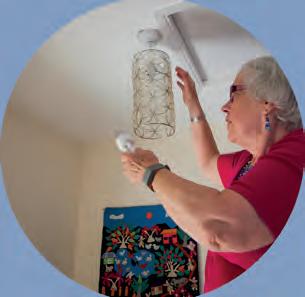





















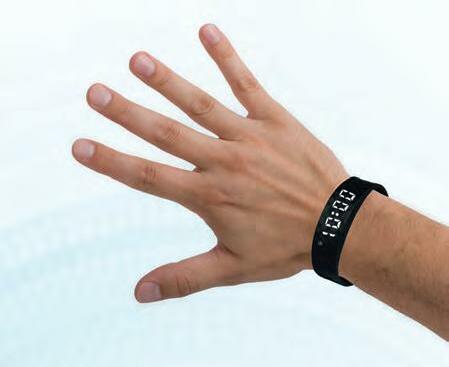









The Assure Life Saving Wristband acticheck.com 0345 25 75 080 ® SOS Alert I’m OK Checks FallAlert A simple squeeze of the wristband calls for help The simple way to confirm you ’ re OK in the morning and before bed. Monitors for severe falls 4.8332 reviews Wh atever h appens,wwherever it h appens, whenever it h appens, help is at h and. U n i n ter r u p te d , comprehensive p rote c t i o n i n you r home, garden and be yond. Automatic Pill Dispensers and Medication Reminders Our products are widely used by Health and Social Care professionals for vulnerable older people and those with learning difficulties who need to be reminded of essential daily tasks such as taking their medication. Find out more today: pivotell.co.uk
CRIME

53enablemagazine.co.uk As new disability hate crime figures are released, there are renewed calls to better train police forces and support the disability community Calling for change on DISABILITY HATE
enable life
In October 2022, charities Leonard Cheshire and United Response released disability crime figures after a series of Freedom of Information requests to police forces across England and Wales. Of the 43 forces contacted, 36 provided data which revealed that more than 11,000 disability hate crimes were reported to police between April 2021 and March 2022. This marks a 25 per cent increase on the previous year, but concerns intensified as it also showed that just one per cent of these cases resulted in a charge or a referral to the Crown Prosecution Service (CPS). The two charities have gathered this information for the last few years, presenting a picture of the impact of disability hate crime in the UK alongside figures released by the government each year.
The number of hate crimes involving an element of violence rose by 27 per cent in comparison to the previous year, and online hate crimes rose by 20 per cent in the same period.
“Since we started gathering disability hate crime statistics from police forces in 2018, we have seen higher numbers of reports year on year. But, unfortunately, the proportion of reports that actually lead to a charge or CPS referral remains shockingly low,” stresses Amy Little, head of influencing at Leonard Cheshire. “There is no acceptable level of disability hate crime. It has no place in our society.
“In the best case, rising numbers of reports mean more people are going to the police and that police are becoming better at recognising and recording disability hate crimes.”
Awareness of what a hate crime is and how to report this if it happens to you has been increasing in recent years, but even if this did account for an increase in reports, the lack of prosecutions is a cause for concern.
“Regardless of the cause, we must treat this as an increasingly urgent problem,” advises Amy. “The numbers should motivate the government and police forces to build on existing work in order to improve support for victims.”
TRAINING
A lack of knowledge of how to best support victims of disability hate crime within police forces could be playing a part in these worryingly low prosecution figures. This presents a clear solution: additional and compulsory training for police forces across the country.
“This is why we are calling for every police force to have a disability liaison officer, so they can properly support disabled people to report hate crimes as they happen and to ensure there are no barriers to victims securing justice,” explains Amy. “We also need to see communities educated about disability and prejudice, so that we can build environments where abuse and harassment are not tolerated.”
As the figures were released, Dimensions announced the launch of training to tackle the under-reporting of learning disability and autism hate crimes. The six-year campaign and national training with police forces comes after 53 per cent of people with a learning disability and/or autism said they have experienced a hate crime over the past year, but 48 per cent of victims did not report it to the police. Through consultation with Avon and Somerset Police, the organisation has improved the e-learning course and will now roll it out to 50 hate crime tactical advocate champions, with hopes of extending this to train 875 officers in the future.
The new online training will support police officers and comes in
addition to a plethora of resources that have already been formulated to educate police forces, judges and the wider Crown Prosecution Service on the impact hate crimes have on the disability community.
In 2016, Dimensions launched the #ImWithSam campaign and this is still ongoing today, giving officers a relatable figure to understand the repercussions of hate crimes.
Through the campaign people are introduced to Sam, someone just like you or your child, but their learning disability makes them a target for verbal, physical and financial abuse both on and offline.
BLUEPRINT FOR CHANGE
This particular campaign has been described as a blueprint for change, with eight points for government institutions and other organisations to work from, encompassing the Department of Education; manufacturers; the Department of Health; the Crown Prosecution Service; the Home Office. These points range from changing the law around online hate crimes and better supporting schools with positive messages around differences in the curriculum, to improving investigation protocols within the criminal justice system, and funding self-advocates to provide specialist victim support.
In 2016/17, when the #ImWithSam campaign first launched, there were 80,393 offences recorded by police in which one or more strands of hate crime were found to be a motivating factor, of these, 5,558 were disability hate crimes. With the release of the latest hate crime statistics for England and Wales, this has more than doubled to the 11,224 disability hate crime reports made in 2021/22 and will continue to increase without more action from the departments in charge.
FOR MORE INFORMATION
Discover resources around disability hate crime from Leonard Cheshire (www.leonardcheshire.org), United Response (www.unitedresponse.org.uk) and Dimensions (www.dimensions-uk.org)
54 enablemagazine.co.uk
enable life
Since we started gathering disability hate crime statistics from police forces in 2018, we have seen higher numbers of reports year on year
enable life




Solutions designed for everyday living Kitchens | Bathrooms | Washrooms | Access | Ironmongery | Daily Living | Wall & Floor Tiles 0845 605 1345 | info@nichollsandclarke.com | www.ncphlexicare.com
As someone with a learning disability, why is my life less important?
Ismail Kaji, who is a parliamentary and government engagement o icer at Mencap, writes about the health inequalities faced by people with a learning disability in the UK and his concerns

As a person with a learning disability, it makes me sad and scared that people like me are dying due to a lack of care and health inequalities. It’s expected and sadly it’s not surprising, but that doesn’t make it any easier to deal with.
AVOIDABLE
Just because I have a learning disability, there shouldn’t be anything stopping me from living a long, healthy life, but new research shows that over 3,000 people with a learning disability died last year, with nearly half dying from avoidable causes.
The figures, taken from the sixth annual Learning from Lives and Deaths (LeDeR) report, found that six out of 10 people with a learning disability died under the age of 65, compared to just one in 10 from the general population. The report also found that men with a learning disability are dying 22 years younger.
There are 1.5 million people living with a learning disability in the UK and it’s tragic there’s so little being done to address our health needs. We shouldn’t be falling through the cracks and dying unnecessarily.
INEQUALITIES

People with a learning disability face serious health inequalities every day, and the LeDeR report shows that there is a lack of care. With access to the right care, many people’s lives could have been saved.
It’s clear that people like me aren’t a priority in the eyes of some healthcare professionals and this worries me. What if I fall ill and have to go into hospital? Will I receive the care I deserve?
The LeDeR report also found that people of Black, Black British, African or Caribbean, mixed ethnic group and Asian, or Asian British ethnicity died at a younger age in comparison to those who identified as White. As someone from an ethnic background, it does make me scared. Why am I less important than everyone else?
BARRIERS
As someone from an Asian background, I often translate for my wife who doesn’t speak much English.
If there was an emergency and she needed urgent attention, it could take even longer for doctors to identify the right care. I can’t imagine how hard it is for someone with a learning disability who doesn’t have that support.
The most shocking statistic is that
40 per cent of people with a learning disability who died last year had a Do Not Attempt Cardio-Pulmonary Resuscitation Order (DNACP) placed on their file. This is a document issued by a doctor, instructing healthcare professionals in hospital settings not to attempt CPR on someone who is dying. In order to do this, they don’t need permission from family members. Everyone should feel like their lives are important and know that if they are going into a hospital, they will not be abandoned and left to die.
People with a learning disability haven’t had the right healthcare for years and things need to change now. We need to get a better system in place, with more funding and education around learning disabilities. We shouldn’t have to see any more unnecessary deaths. Please don’t forget about us, our lives are just as valuable as anyone else’s.
FOR MORE INFORMATION
To find out more about Mencap and the work that they do, visit www.mencap.org.uk
56 enablemagazine.co.uk
We shouldn’t be falling through the cracks and dying unnecessarily
enable voices
Ismail


with Childrens Now Available Car insurance adapted for you If your vehicle has been adapted or modified to cater for your disability, or you’re a carer who needs bespoke cover, experienced insurance experts at Adrian Flux can talk you through our tailor made policies. Call Adrian Flux today to make even bigger savings with our newly reduced rates. Policy benefits can include: M New for old cover on adaptations M Breakdown cover M Any driver cover available M And many more... Call our UK team on 0800 587 5288 Ask us about our new for old cover on adaptations adrianflux.co.uk Authorised & regulated by the Financial Conduct Authority Trustpilot rating checked on 24th August 2022
TOYOTA AYGO X
INSIDE
The Toyota Aygo X might make a passable stab at looking like a pint pot off-roader on the outside, inside it’s very much a city car. However, there’s a good driving position with decent adjustment and plenty of space for arms, legs and head. The seat is also very supportive, which is not always the case with cars of this size.

The controls are arranged with Toyota’s usual thoughtfulness and attention to detail. It’s pleasing to see individual rotary controls for the heating and ventilation rather than them being run through the infotainment screen. The touchscreen for the infotainment is a 7-inch item in the entry-point
Pure trim, but is increased to an 8-inch version on the Edge, and both come with Apple CarPlay and Android Auto.
While space is good in the front, it can be a tight squeeze in the back seats for adults. It won’t be an issue for younger children, but teenagers will certainly feel the pinch.
Move round to the boot and the Aygo X’s 231-litre cargo capacity is far from the most generous, even by city car standards. However, it’s shaped so there are no intrusions and you can use every last litre of space, but you won’t get a wheelchair in here unless you tip the 50/50 split rear seat down to free up a maximum of 829-litres of load volume.

58 enablemagazine.co.uk
Alisdair Suttie takes the Toyota Aygo X for a test drive
REVIEW
The Toyota Aygo X is available through Motability with no Advance Payment. Find out more at www.motability. co.uk


EQUIPMENT
The Pure starting point to the Aygo X range comes with 17-inch alloy wheels, electric front windows, air conditioning, automatic headlights, 7-inch touchscreen infotainment, and Toyota’s Pre-Collision with Cyclist Detection system that works in the day and at night. There’s also adaptive cruise control, lane keep assist, and a reversing camera as standard that makes it very easy to park the Aygo X. Move to the Edge and you get two-tone paint, 18-inch alloys, climate control, auto wipers, and rear privacy glass. This trim also has an 8.0-inch infotainment display. The Exclusive and Limited Edition trims are not offered through Motability.
DRIVING
The 1.0-litre, three-cylinder engine in the Aygo X feels fun and zesty to drive. Its 71bhp is enough to see it from 0-62mph in 14.8 seconds with the automatic gearbox, which is a bit behind a Hyundai i10, but around town the Toyota is more than able to keep pace with traffic. It’s also more than happy when nipping out of junctions.
On faster roads, the CVT (continuously variable transmission) auto gearbox often causes the engine to rev higher than feels comfortable until you get up to speed. Once you’re at a cruise, the engine settles back to being quiet and there’s not too much wind or road noise.
On broken roads, the 17 or 18 inch alloy wheels of the Aygo X,

depending on which trim you pick, give an excellent ride. It’s helped by a reasonably tall profile for the tyres, so they assist in soaking up surface imperfections. The handling is also very well judged, so throw in a tight turning circle and the Aygo X is a very fine small car to drive.

SUMMARY
With no PIP Advance Payment, the Toyota Aygo X is cheap to run and well equipped, but it has a small boot.
59enablemagazine.co.uk
enable motoring
The controls are arranged with Toyota’s usual thoughtfulness and attention to detail

































































Email: sales@vaporricon.co.uk www.vaporricon.co.uk Vapor Ricon Europe Ltd. Falcon Works, Meadow Lane, Loughborough, LE11 1HS Call us now on 01509 635 920 Always insist on it being a Ricon Lift Innovations In Accessibility Ask your vehicle converter to only fit a Vapor Ricon Lift – like, for example, the K SERIES. • Automatic folding lift • Unobstructed view for driver and passenger • Easy operation and maintenance • 350KG lift capacity WASH WASH EFFECTIVELY EFFECTIVELY WITHOUT WITHOUT WATER WATER APPLY, NOWAVAILABLEON PRESCRIPTION ASKYOURGPABOUTNILAQUA CALL:01453357337;EMAIL:HELLO@WATERLESSLTD.CO.UK MASSAGE,TOWEL-OFF GET 20%OFFTHEENTIRE RANGE USECODE"ENABLE20"AT WWW.NORINSE.CO.UK
Product Roundup
Our pick of products for this winter

HYGIENE
NO RINSE LIQUID SHAMPOO
Nilaqua, available on prescription www.norinse.co.uk

This revolutionary rinse-free shampoo is perfect for people who have trouble bathing or people living with dementia. Not a dry shampoo but a gentle liquid, this product lifts all dirt, sweat and grease into the solution when massaged into the hair. This can then be towelled off, leaving you with soft, clean hair.

SAFETY
THE ASSURE LIFE-SAVING WRISTBAND
Acticheck, from 42p per day www.acticheck.com, 0345 257 5090
This simple to use, life-saving wristband gives you uninterrupted protection: it is waterproof with a one-year battery life, meaning it will always be there when you need it. You can easily call for help by squeezing the wristband and it also monitors for severe falls so even if you are unable to raise an alert, help is at hand.

MOBILITY


THE CENTAUR
POA, Centaur Robotics www.centaurrobotics.com
This self-balancing, two-wheeled power chair is designed for the world you live in. It fits into the space of a dining room chair and spins on a sixpence. A lifting column elevates you to eye level, extending your reach and taking you higher. Beautiful, safe and easy to operate. Reserve your Centaur now.

HOME
COTTON TEA TOWEL
£12.50, Scope shop.scope.org.uk
Make a statement at home this winter with one of disability charity Scope’s slogan tea towels. Available with text reading ‘equality isn’t just a buzzword’ or ‘time to change attitudes’, proceeds from each sale go towards the charity’s services for disabled people.

CHRISTMAS ROYAL HOSPITAL FOR NEURO-DISABILITY CHRISTMAS CARDS
From £5.00, Charity Cards Online www.charitycardsonline.com
Give back while celebrating the festive season by purchasing Christmas cards or gift wrap that benefits disabled people’s organisations and charities. This year, the Royal Hospital for Neurodisability has 13 packs of cards and four gift wraps to choose from, with all money raised going on to support the specialist hospital’s services.

HEALTH
OPTICARE EYE-DROP DISPENSER
£9.00, RNIB shop.rnib.org.uk
This eye-drop dispenser has been created to accurately target the eye, also allowing users to squeeze the bottle with minimum pressure. The dispenser clips around most sizes of eye-drop bottle and can be adapted to fit non-standard bottles.
enablemagazine.co.uk

61
enable life
Subscribe to

s the UK’s most respected and exciting disability and lifestyle publication, each issue of Enable Magazine is bursting with relevant and exclusive content from real life stories and celebrity interviews to advice and spotlight features on the topics that really matter to readers.




Every issue we cover subjects pertinent to the disablity community whether you have a physical, hidden, learning disability and/or mental health conditions, you are a paid or unpaid carer, or a medical professional working with disabled people.



From interviewing politicians, activists and big names in disability

investigating topical causes such as the wait times for an autism
stem


treatments
WHAT DOES IT COST?
HOW DO I GET INVOLVED?

By phone


to
diagnosis and
cell
for multiple sclerosis, Enable goes above and beyond to produce engaging content. A Subscribe today and get the UK’s leading disability and lifestyle title delivered right to your door November / December 2022
Call a member of the subscription team on 0844 249 9007, and we can take payment details over the phone. By post Complete the form below and send alongside a cheque to the address at the bottom of the page.
If you are a UK resident, there are three quick and easy ways you can subscribe to Enable Magazine: 1 2
You can subscribe for either one or two years at a time. • One year (six issues) - £15 • Two years (12 issues) - £25 Online Head to enablemagazine.co.uk/ subscribe to enter your payment details and pay via PayPal. It’s completely secure! Subscribe to Enable Magazine Name: Address: Postcode: Tel: Email: Signed: Date: Please return this form to DC Publishing Ltd, 198 Bath Street, Glasgow, G2 4HG I enclose a cheque made payable to DC Publishing Ltd for: £15 (1 year): ■ £25 (2 years): ■ Please enter your details below: 3
HAVE YOU GOT A PROBLEM WITH ALCOHOL? ONLY YOU CAN DECIDE!
To answer this question ask yourself the following questions and answer them as honestly as you can
1.Is drinking making your home life unhappy?
2.Does your drinking make you careless of your families welfare?
3.Do you drink because you are shy with other people?
4.Is drinking affecting your reputation?
5.Do you drink to escape from worries or trouble?
6.Do you drink alone?
7.Have you lost time from work due to drinking?
8.Has your ambition decreased since drinking?
9. Has your efficiency decreased since drinking?
10.Is drinking jeopardising your job or business?
11. Have you ever felt remorse after drinking?
12.Are you in financial difficulties as a result of drinking?
13.Do you turn to or seek an inferior environment when drinking?
14.Do you crave a drink at a definite time daily?
15.Does drinking cause you to have difficulty in sleeping?
16.Do you want a drink the next morning?
17.Do you drink to build up your confidence?
18.Have you ever had a complete loss of memory as a result of drinking?
19.Has your Dr ever treated you for drinking?
If you have answered “YES” to any one of the questions, there is a definite warning…
If you have answered “YES” to any two, the chances are that you have a problem…
If you have answered “YES” to three or more, you most certainly have a problem…
“THE ONLY REQUIREMENT IS A DESIRE TO STOP DRINKING”
Take action now and give us a call on 0800 917 7650… We are here to help!

PATHFINDERDECEMBER 2016 17
Keeping this winter
Increasing the physical activity in your daily routine has a host of benefits, it can aid your physical health and mental health, but also builds confidence and can even tackle social isolation
Adding more exercise into your routine during the winter can be especially helpful if symptoms of your disability are exacerbated by cold weather, with exercise helping keep your joints warm and flexible.
As the winter gets underway, it might be harder for you to get outdoors or undertake your usual activities, but there’s plenty of ways to keep active while the days are shorter. The best activity for you could depend on your disability, any symptoms you have and where you live, but there is a wealth of options regardless of your situation. Depending on what classes you would like to attend or the type of exercise you want to undertake, adding more activities into your routine can also be affordable, or in some circumstances, free.

Depending on your individual needs, there is different things to consider before you pursue a new activity. Think about what you have enjoyed doing in the past or liked watching; if you would prefer to take part in a disabled-only or mixed group; how often you want to attend and if you’ll have to travel, how you’ll get there. You should also consider whether you will need any equipment and what this will cost, and if you have any goals you would like to achieve through pursuing more exercise.
IN THE WATER
Exercises that can be done in water, like swimming or water aerobics, are great in winter because they take place indoors and pools are usually heated. These are also great for people with certain disabilities who might find highendurance exercises, like running, difficult. Exercise in the water is low impact thanks to the buoyancy taking weight off of muscles and joints. You may find that you’re able to do more or move more in the water than in other circumstances.
As well as being good for the joints, regular swimming has been proven to reduce the risk of chronic illnesses like heart disease, diabetes, stroke and dementia. Like any physical activity, swimming is good for your mental health and can be part of a healthy lifestyle.
Finding local pools or swimming clubs in your area is simple. Scottish Swimming (www.scottishswimming.com) and Swim England (www.swimming.org) both have search tools available online, also allowing you to find clubs for children, young people and adults with disabilities. Once you have found your local club, you can call them to find out what accessible measures they have in place like a hoist or a changing places toilet on site. If you are unsure of what exercises are right for you and your disability, speak to a health professional.

64 enablemagazine.co.uk
Swimming has been proven to reduce the risk of chronic illnesses
FIT
enable sport
IN THE OUTDOORS
Despite the colder weather and shorter days, there’s still ways to get exercise in the outdoors this winter. It can be helpful to do this by joining a local club so that you’re only out in a group when its dark, this is also a great chance to meet new people and tackle isolation. The best way to find group activities to take part in is finding out what is available in your local area. You could search online to see what your local council provides, call your closest leisure centre or ask someone at a day centre you attend to help you search for opportunities like inclusive running clubs or park meet-ups.
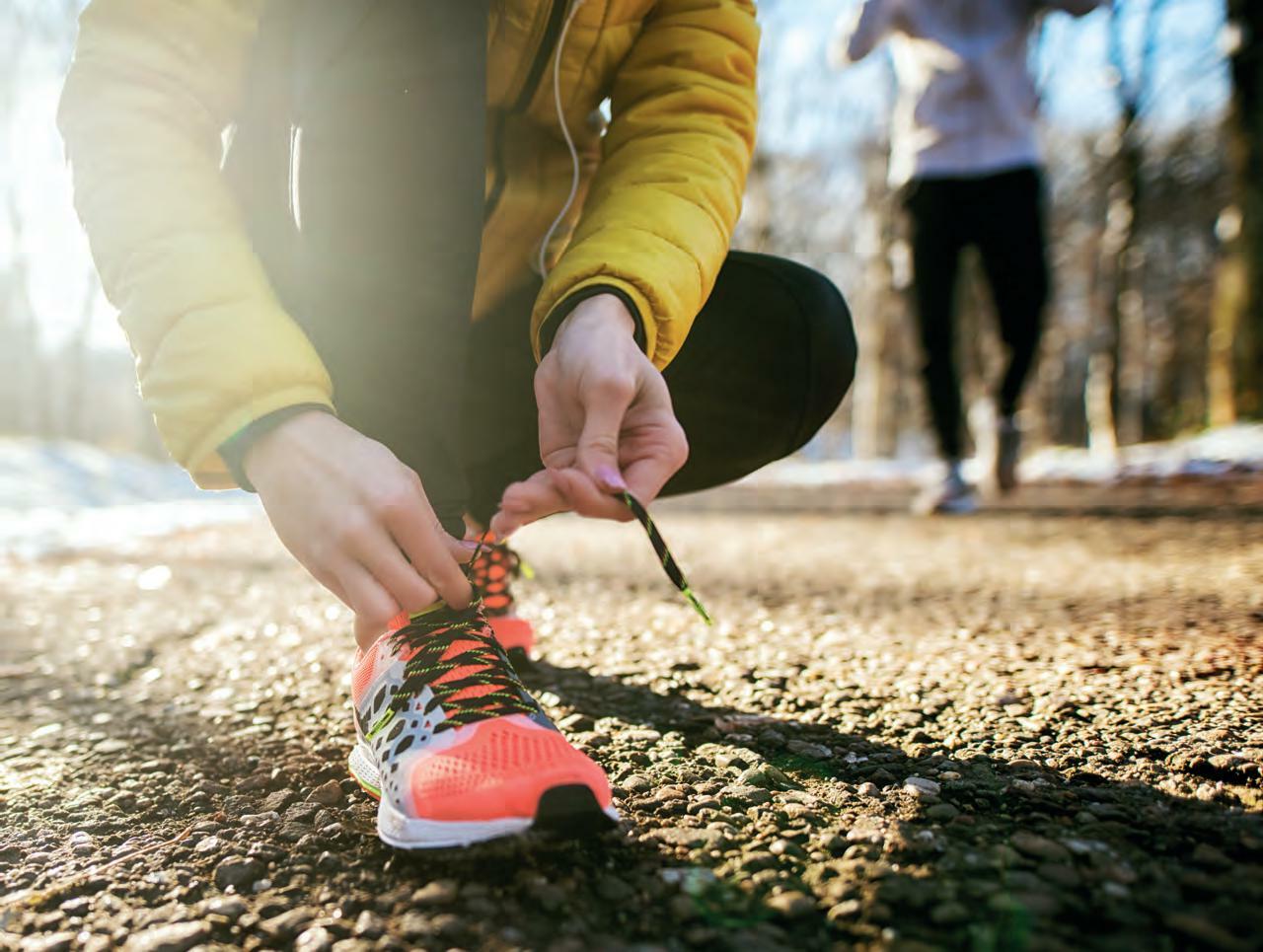
If you want to take on something a bit more daring this winter, you could try adaptive snow sports. Disability Snowsport UK (www. disabilitysnowsport.org.uk) highlight the opportunities available and is a great resource to find out about the different ways you can get involved depending on your unique needs.
AT HOME
If you are limited to when you can leave your home, it doesn’t mean there isn’t opportunities to keep fit this winter. Since the coronavirus pandemic began, many disability-specific charities have continued to provide at-home workouts on their websites. These vary in intensity and are highly adaptable, making them suitable for all levels of fitness and mobility. The MS Society (www.mssociety.org.uk), Mencap (www.mencap.org.uk), WheelPower (www.wheelpower.org.uk) and more have these resources available to access for free online.
Audio-led workouts are essential for people who are blind or visually impaired, but the audio only workouts have increased in popularity over the last few years and so now there is a wealth of options on the market. While these are often geared towards the blind and visually impaired community, they can also be helpful for people who experience overstimulation or find it
difficult to focus when using workout videos or apps in the home.
The audio-led workout you choose will depend on the activity you want to pursue, but some providers create these specifically for the disability community. British Blind Sport (www.britishblindsport.org.uk) have a host of workouts available from yoga and stretch classes to high intensity boxercise and weight lifting classes. YouTube (www.youtube.com) channels like Eyes-Free Fitness also feature different levels of audio only workouts.
FOR MORE INFORMATION
To find local clubs that fit your needs and more activities, visit the Parasport website (www.parasport.org.uk)
65enablemagazine.co.uk
We all welcome a little extra assistance now and again, particularly when travelling alone. Thistle Assistance is an initiative to help you feel safer and more comfortable when using public transport.
thistleassistance.com
On 14 November, AntiBullying Week will kick off with Odd Socks Day. We sit down with the director of the AntiBullying Alliance, Martha Evans, to learn more about the importance of the week and finding solutions
TIME TO REACH OUT
Why is Anti-Bullying Week so important?
Anti-Bullying Week gives schools a chance to raise awareness of bullying and to listen to the voices of young people. It’s a chance for them to improve their practice, to talk about the solutions. We know about a quarter of all children experience bullying frequently: that has a massive impact on their life chances because they might miss school or feel excluded, and it’s a big strain on mental health. We know the impacts can last well into adulthood. Adults who are bullied as children are more likely to experience major mental health issues, to earn less money and to not be in employment, education or training.
How did you come up with this year’s theme, Reach Out?
We develop the theme with young people every year. We’re saying that
it doesn’t have to be this way and we can address it by reaching out whether you’re at school or its online. If you’re being bullied, seeing it happening or you are the bully, it’s important to talk to someone you trust.
Why is the week particularly important for children with a disability?
We know that disabled children are more likely to experience bullying than others unfortunately. We’ve got some new resources on our website around autism and bullying in particular and we have things like easy read definitions. We also have a programme called United Against Bullying which is available free to all schools in England and that programme focuses on a list of disabilities and when bullying tends to take place.
How can we start to reduce bullying behaviour in schools?
We often find that school’s responses are focussed on changing the behaviour of the disabled person being bullied, like helping them to make friends or changing where they go over the course of the school day, but that sends the wrong message to young people. We have to think about how we can get the behaviour to stop rather than the response. We have two online CPD courses which are free for anybody to
take part in and focus specifically on disability and bullying.
We need to establish school cultures where we celebrate everyone’s differences, and teach kindness and respect for everybody, not just kindness and respect for your friends only.
Do you have any advice for parents and carers of children who are experiencing bullying?
It can make you so upset and angry, it’s such a difficult thing to go through as a parent. The first thing to do is listen to them and reassure them that coming to you was the right thing to do. Stay calm and try not to encourage them to retaliate, ask your child what they want to do next, whether they want to speak to the school together or try a different tactic. Think about discussing the situation with your child’s teacher and make sure that you keep a log of the situation. Then, find ways to grow your child’s confidence because it can feel quite isolating. Find things they’re passionate about and see if they can connect with people through that.
Learn more about Anti-Bullying Week at www.anti-bullyingalliance.org.uk
FOR MORE INFORMATION
67enablemagazine.co.uk
It can make you so upset and angry, it’s such a difficult thing to go through
enable life




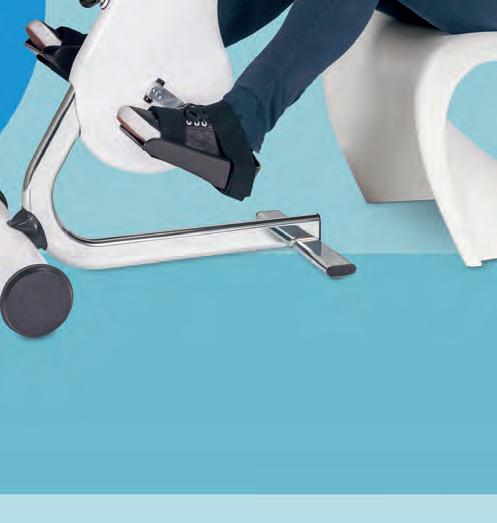












www.motomed.com
APPLYING TO College
From January, higher education colleges throughout the UK will begin to open applications for the 2023/24 academic year. Over the next few months, it’s time to consider your options, whether college is right for you, and if so, where you want to study.
Doing thorough research is key: consider what you want to study; whether you want to or are able to move away from home to do this; if you will need to be referred to a new medical or social care team in your choosen location; what support or accessibility measures different colleges offer and if these fit your needs.
VISIT
The best way to decide what colleges you want to apply to is to attend an open day. Sites like Open Days (www. opendays.com) keep a list of open days throughout the UK. These happen on select dates throughout the year and will depend on each individual college, but many institutions will allow you to arrange a visit outside of these. Going for a solo tour can be extremely beneficial if you have specific questions about accessibility, adaptive learning or other support relating to your needs.
If you plan to move further away from home for college or there isn’t good transport links, it might be difficult to attend an open day or a one-to-one visit with a particular college. In this situation,
there are still ways you can find out if it’s the right fit for you. Speaking to current students can be extremely helpful if you want to know more about the culture on campus or what support is actually like once you start your studies. This might be something that the college you are interested in arranges each year or you could contact the disabled students’ office at the institution who could put you in touch with a current student. Alternatively, services like Unibuddy (www.unibuddy.com) allow you to connect with people who are already studying, asking them questions online and learning about their experiences.
APPLICATION
Like university applications, you can use the Universities and Colleges Admissions Service, aka UCAS, to apply to some colleges, but you normally apply directly. This can mean submitting a number of
different applications rather than one for all of your choices. Depending on the courses you are applying for, adapt these for the different requirements and the topics that the course covers. Your college application can be submitted online and each institution will have their own closing date. Some of these are even specific to each course.
By doing thorough research and ensuring you know whether a course and college is the right fit for you, you can start work on your college application knowing you’re prepared for what’s ahead.
FOR MORE INFORMATION
If you have questions about the application process or college in general, contact the institution you’re interested in directly or speak to the Disabled Students Helpline (www.disabilityrightsuk.org, 0330 995

As the new year approaches, it’s almost time to consider your next steps and start working on your college application
69enablemagazine.co.uk
enable education
0414)
Going for a solo tour can be extremely beneficial if you have specific questions
“ “





•Individual learning programmes •Communication •Independent living skills •Work experience and supported internships •Personal & social development •Community engagement • Therapies •Qualifications, accreditation and awards We are a small day and residential Specialist Further Education College in the heart of Shropshire, supporting learners aged 18+ who have moderate to severe learning disabilities and PMLD. Our Education Pathways provide a wide ranging curriculum including: 01743 872250 www.condovercollege.co.uk admissionsandcontracts@condovercl.org.uk Apply now or enquire today Achieving dreams & aspirations Specialist Further Education Achieving dreams & aspirations Condover Care and Learning
GETTING ON THE Employment path
Preparing for the world of work can feel scary, but pursuing a dedicated supported employment programme can give you the skills and confidence you need
Supported internships are the perfect fit for young people with a learning disability who want to get a job but may need extra support during this process. Geared towards young people aged between 16 and 24, the study programmes are provided by further education colleges, sixth form colleges and independent specialist providers. Young people who are interested in this path usually need a Statement of Special Educational Needs and Disabilities, a Learning Difficulty Assessment or an Education Health and Care Plan.

When pursuing a supported internship, young people get the chance to work with a local employer to gain training, support and work skills in a particular industry or role. They can also include the chance to gain qualifications while you work.
OPPORTUNITIES
Providers offer the employment path in many different industries, including healthcare through the NHS. The NHS Employers Learning Disability Employment Programme was developed to remove barriers to employment for people with a learning disability and/or autism in the NHS both locally and nationally. The health service does this by recruiting staff through supported internships, mainly using national providers like Health Education England’s Project Choice (hee.nhs.uk) and DFN Project SEARCH (www.dfnprojectsearch.org).
If you aren’t sure where to start, or don’t have a particular job or industry in mind, Mencap (www.mencap.org. uk) can help. The learning disability charity work with employers that have supported work experience placements for people with learning disabilities. Their employment programmes help people progress towards and stay in paid employment as well as offering work experience opportunities.
ADVICE
Many disabled people’s organisations offer information and advice on supported employment and paths into work for disabled young people online and over the phone or through email. Disability Rights UK (www. disabilityrightsuk.org) have a section online dedicated to careers advice, information on disabled people’s rights at work, how to find disability-friendly employers and more.
Working with employers, the National Development Team for Inclusion (NDTi) can offer a range of employmentfocused consultancy, service development and training support to ensure workplaces and employers are ready to be inclusive, welcoming places. The information the organisation has online (www.ndti.org.uk) not only covers helpful services and advice for employers, but provides information for people with a disability to read and learn from before looking for work or supported employment positions.
71enablemagazine.co.uk
FOR MORE INFORMATION Find further job opportunities and information through the National Careers Service (www.gov.uk) and Skills Development Scotland (www.skillsdevelopmentscotland.co.uk)
Young people get the chance to work with a local employer to gain training, support and work skills
enable employment
VALUE OF A CHIEF DIVERSITY OFFICER
Over the last year, large companies have began recruiting for the role of a chief diversity officer, leading to questions of what the role actually entails, whether these individuals can create meaningful impact, and importantly, if disability is on their agenda
As vacancies for chief diversity officers or similar positions begin to pop up online, one thing is clear: people in the disability community want to know whether companies are ticking a box, or if this is the start of a movement for positive change.

Joseph Williams, who is autistic and has a chronic health condition that makes him sporadically physically disabled, is the founder of inclusive recruitment platform Clu. He highlights that Clu was born out of necessity because he couldn’t find employment that was accessible or inclusive of him. After a brief stint at a dating app, Joseph decided to apply the algorithms used by dating sites to recruitment, better matching people’s skills with job vacancies. Along with recruitment, Clu is doing research and campaign
work to better understand the current landscape of employment.
For Joseph, concerns around the implementation of chief diversity officers stem from the idea that much of their work is about public perception and representation, rather than policy, practice or workplace culture.
VALUE
“All of these things do a lot of good for the world, but companies often aren’t actually speaking to disabled people and so it doesn’t actually trickle down to benefit them directly,” highlights Joseph. “We saw all of these organisations get behind disability pride month in July and lots of campaigns came from that, but it was from skincare lines with inaccessible products, designers who don’t produce adapted clothing.
“We are seeing big diversity pledges on inaccessible websites, companies appealing for more autistic people to apply for work, but then presenting interfaces that aren’t inclusive of neurodiverse people. This needs to be about infrastructure, it’s not just campaigning.”
Actions like this are often seen as a
72 enablemagazine.co.uk
An inclusion officer
or a
culture
officer could be a far more important role than a chief
diversity officer THE
box ticking activity but rarely improve access to the workplace for disabled people, or in-work support for people already in work. A consistent oversight is not including marginalised groups in the planning of measures that affect them or are put in place in an effort to support them.
“For me, an example of this is the right to go straight to interview stage through the Disability Confident Scheme,” highlights Joseph. “I understand the intention, but this was designed by people who don’t know just how talented the disability community is.”
When we discuss diversity and inclusion, this should cover all protected characteristics as defined by the Equality Act – age; disability; gender reassignment; marriage and civil partnerships; pregnancy and maternity; race; religion or belief; sex; sexual orientation – but often organisations are seen to focus on gender, sexual orientation and race, and disability falls to the bottom of the list if it even appears.
The latest example of this came in October 2022 as Amazon announced a $150 million fund for firms backing under-represented founders, except there was no mention of disability.
“We are kind of falling into this trap of representation being more important than lived experience and the actual output of an organisation, and I think that’s the challenge of the chief diversity officer probably more so than anything else,” admits Joseph. “All you need to do is look at reporting to understand what companies are really paying attention to and where there is a point of accountability, and I am curious to see how many actually include disability moving forward.”
ACCOUNTABILITY
When discussing accountability, Joseph refers to the need for statistics and reporting on things like the disability pay gap: factors that give quantitative information in order to then make improvements. But this information can’t act alone, it has to work in conjunction with the input of disabled people, or any marginalised community.
“We see board reports on gender, sometimes ethnic diversity, and these
are so important, but with disability it sometimes feels like companies want to improve without actually putting the time and money into improving the experience for disabled people,” stresses Joseph. “We need to get better at mobilising and taking lessons from how the Black community and women have mobilised, we need to be much better at holding organisations to account.”
The intention behind having a chief diversity officer might be well-meaning, but Joseph believes there is different ways to make a positive impact.

“An inclusion officer or a culture officer could be a far more important role than a chief diversity officer, because diversity is just about the
statistics alone, whereas inclusion and workplace culture is the stuff that genuinely changes people’s lives,” says Joseph. “Until we start to be a little more specific around what exactly is expected of a chief diversity officer, it will be difficult for any underrepresented group to get a piece of the pie because we don’t know their focus or intentions, and so it’s difficult to give input that could make a difference.”
FOR MORE INFORMATION
Learn more about Clu and their recent campaign work at getaclue.io
73enablemagazine.co.uk
enable employment
Joseph Williams





















BRITISH SIGN LANGUAGE ONLINECOURSE £3 £25 Beginners 20hrsCPD Studyfromhome Stafftraining Learnatyourownpace Paywhatyoucan:Currently,tomakeiteasierformorepeopleto learnBritishSignLanguage,youcandecidewhatyouwishtopay (minimumcontributionof£3). Our Equality, Diversity, and Inclusion strategy is a priority at RoS. It’s not a one off or an event, it is an ongoing process, and we will work for our colleagues to feel safe, supported and included at work. We want to be an employer of choice, attracting and retaining the best and widest possible pool of talent. We’ve equality at our core. We’ve been named as a disability confident employer by Jobcentre Plus and have a positive attitude towards job applications from disabled people. As we progress, we’ll continue to improve the way that we support our staff, customers, and stakeholders, regardless of disability, gender, ethnicity, age, religion, or sexual orientation. EarnLearnProgress We recognise the value that everyone brings to our organisation. Through our ‘Job Interview Guarantee’ we will consider you on your abilities and guarantee an interview where you meet the essential criteria for the post. We have a wide range of jobs at entry and qualified level and offer great opportunities such as DFN Project SEARCH, a programme for young people with disabilities – and much more. Further information on NHS Lothian initiatives; www.careers.nhslothian.scot/workforce-development email: careersforall@nhslothian.scot.nhs.uk vacancies: https://apply.jobs.scot.nhs.uk @NHS_Lothian @yourNHSLfuture NHS Lothian Opportunities Over 100careerpaths – oneemployer SKILLS You can build on the skills you are good at STRENGTH You can support your career goals AMBITION You can match your skills to those we need INTEREST You can develop your interests into a career Awards Aware awardsnetwork.org
Valuing employee needs at REGISTERS OF SCOTLAND
Registers of Scotland (RoS) is the Scottish organisation responsible for keeping public registers of land, property and other legal documents. Through offering a range of support to employees, RoS creates an environment for people to thrive at work. Sue Rees has worked across multiple departments at the Disability Confident employer, utilising the offer of flexible working hours, and continuous training and development opportunities.
FOCUS
Sue lives with a primary immune deficiency, which means her immune system struggles to fight infection, and also cares for her son. Throughout her years at RoS, Sue has benefitted from the employer’s positive attitude towards support for disabled colleagues.
As flu season began in winter 2019, this became especially important when she had to prioritise her health. Sue was met with understanding and was given the opportunity to take on a temporary role with the human resources team. This allowed her to work from home in order to protect her health. When the coronavirus pandemic caused a full shift to at-home working, Sue then joined the colleague experience team, helping to make a positive difference for the people she works with.
“We are really focused on inclusion
and diversity as an employer because we recognise that it actually makes us stronger,” enthuses Sue. “The more diverse your team is, the bigger the wealth of experience you have.

“If you include everybody in decision making then you have a stronger organisation and hopefully an organisation that is also attracting new skills from a diverse range of candidates. We like to ensure that everybody can have a good day at work.”
CARE
At RoS, meeting employees’ needs has always been a priority, but this dedication was taken further with the creation of an employee forum and steering group.
“Because we have these things we know that people care,” reveals Sue. “Our chief executive takes it very seriously and that makes all the difference: the people at the top of the organisation really care.
“Your needs and ideas are taken seriously so you get the time and resources you need to implement things.”
For Sue, feeling valued, appreciated and heard by senior figures at RoS means that she is happy and comfortable in the workplace and knows that her colleagues feel the same. She says: “It’s delightful and reassuring to know that if anything ever did arise, or if someone acquired a disability, the support is there and you don’t have to worry about that at work.”
FOR MORE INFORMATION
Find out about career opportunities with Registers of Scotland at www.ros.gov.uk
75enablemagazine.co.uk
enable employment
The more diverse your team is, the bigger the wealth of experience you have
Input from a range of employees can create a more innovative workplace. At Registers of Scotland, the team is dedicated to creating an inclusive workforce where individual skills and talents are valued
Building confidence during the job hunt






QI feel like I’ve lost all of my confidence. I’ve applied for many jobs, and have always been rejected. I don’t know why I’m rejected, but I assume it’s because I’m disabled. I’m beginning to feel like I’m probably not good enough to get a job and that there’s not much point in applying any more.
AYour experience, unfortunately, is far from unusual. Some employers and recruiters, irrationally, are wary of employing disabled people because they fear we will be less productive, have loads of time off sick, or be really expensive or difficult to employ. In nearly all cases, these fears aren’t borne out in reality. In fact, disabled candidates tend to be premium candidates. We have the same diverse range of skills and qualities as anyone else, and we’ve also developed
the additional skills we need in order to navigate around all of the various barriers we face.
The problem is two-fold. The reality is that some less-enlightened employers may wrongly (and illegally) be less likely to employ disabled candidates. To increase the odds in your favour, try to focus your job search on those employers who understand that disabled candidates are often premium candidates (for example, employers who pay to advertise on a specialist disability job board like Evenbreak).
The other, and most important reality for you to understand, is that being
disabled does NOT make you a poor candidate. Focus on identifying your strengths. What knowledge, experience, talents and personal qualities do you have? What skills have you developed in order to manage the disabling barriers you come up against? If you need help with this, please look at the resources on Evenbreak’s Career Hive, or have a couple of sessions with one of our career coaches (who all have lived experience of disability themselves).
And the next time you apply for a job, don’t forget you are a premium candidate – and remind the recruiter of that, too!

YOUR QUESTIONS, ANSWERED
Evenbreak (www.evenbreak. co.uk) is a social enterprise run by and for disabled people, with a specialist job board and a career hive (hive.evenbreak.co.uk) where you can receive career advice and
personalised support.
In this series, Jane Hatton, founder of Evenbreak, answers your employment-related questions. If you have a question for Jane to answer send it to editor@dcpublishing.co.uk


enable employment
Jane Hatton
EMPLOYMENT Q&A
In her column Jane Hatton, founder of Evenbreak, answers your employment questions
76 enablemagazine.co.uk
Award
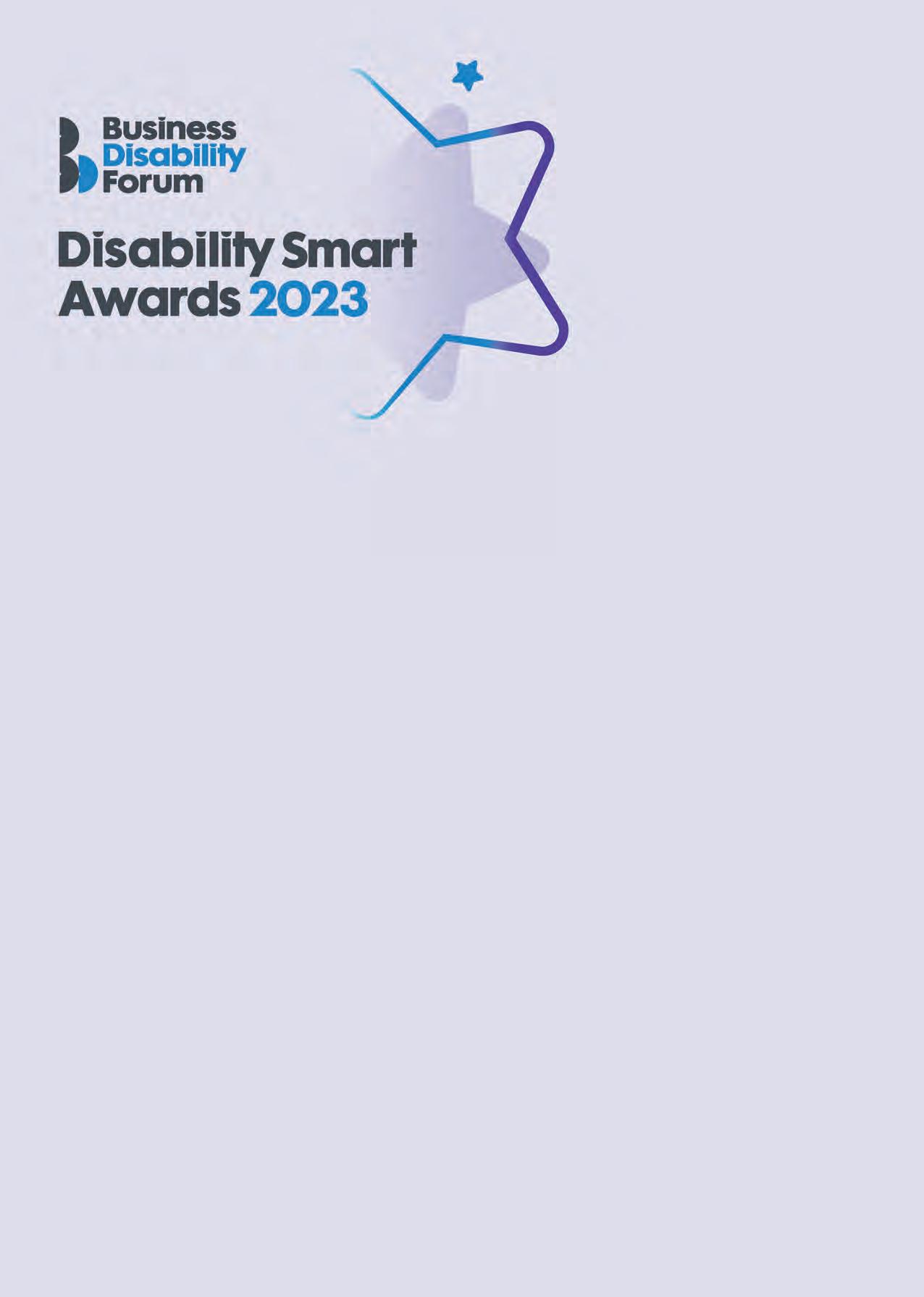
The Disability Smart Awards are a wonderful way to recognise the inspiring actions of individuals, businesses and organisations who are already working toward inclusion. [Award winner] businessdisabilityforum.org.uk/ disability-smart-awards-2023/ #DisabliitySmartAwards 2023
categories Disability Smart Diversity and Inclusion Professional Disability Smart Leader Disability Smart Technology Disability Smart Inclusive Workplace Experience Disability Smart Inclusive Recruitment Disability Smart Inclusive Communication Disability Smart Inclusive Customer Service Disability Smart Accessible Built Environment Disability Smart Learning and Development Disability Smart Inclusive Product Design Disability Confident Mental Health and Wellbeing at Work * Disability Confident Impact * Disability Confident Small Business * * In association with The Department for Work and Pensions, for organisations registered with the Disability Confident Scheme. Proud of something your organisation has done to support disability inclusion? Enter Business Disability Forum’s Disability Smart Awards. Open to organisations of all sizes and sectors that are improving the life experiences of disabled employees and consumers, by removing barriers to inclusion. Open for entries from 1 December 2022.
Examining
UNEMPLOYMENT RATES
Earlier this year, the latest NHS Adult Social Care Outcomes Framework revealed that some areas of England had no adults with a learning disability in paid employment last year. This shocking data also showed that fewer than a quarter of English local authorities reported an improvement in the learning disability employment rate on the previous year.
The new information comes as the UK Govenrment reports that the overall unemployment rate for June to August 2022 was just 3.5 per cent, the lowest rate seen since December to February 1974. While this is positive for the overall job market, it masks the true state of employment for people with a learning disability who are able to work. Paid employment is essential, providing independence, skills and income, but still only five per cent of this group are in paid employment.
Employment and skills programmes that are specific to this community are trying to create change, and their ideas could benefit employers around the country and the wider economy.
INCLUSION REVOLUTION
DFN Project SEARCH have been running a transition to work programme for students with a learning disability and/or autism in the UK since 2008, and have helped more than 1,300 young people into paid employment. Now, the organisation’s new campaign is aiming to highlight this under-utilised group to employers.
“Inclusion Revolution is all about saying to employers ‘we’re not sure if you know about this hidden talent pool and you may want to run
supported internships’,” explains Claire Cookson, chief executive at DFN Project SEARCH. “Through Inclusion Revolution, employers can partner with us for training and advice on recruitment practises, in-work support, and how to get the best out of this incredible talent pool.
“Typically, people with a disability stay in jobs three and a half times longer, they take less time off sick and they are more punctual. I just think employers don’t have any idea how to access them.”
With input from their youth advisory board, the organisation is concerned that barriers exist from the first steps of recruitment, not just in the workplace.
“Most employers don’t have recruitment practises that allow these people to shine because they might be relying on algorithms or asking people to submit a formal CV before a traditional interview takes place,” offers Claire. “That’s probably not the way to get the best out of most of us. Our youth advisory board have said that recruitment doesn’t feel fair or open or inclusive, and it means employers are missing out on this brilliant group
of society just because of the way they recruit.”
Creating more inclusive employment opportunities, especially for young people, can’t just be a tick box exercise or a PR move.
“It’s absolutely ok to actively recruit people who have protected characteristics, I love to see organisations do that, but not because they’re trying to improve their corporate image,” stresses Claire. “It has to be because they recognise they need those skills and talents. I would really like employers to consider how they could make in-work support better for everybody and diversify their recruitment styles.

“It’s not about shaming companies, it’s about them being aware and then being active in addressing some of those gaps in their agenda.”
LITTLE GATE
Supported employment charity Little Gate was created after the founder, Claire, became concerned about finding meaningful employment opportunities as someone with a learning disability. After looking at models of supported employment through the British Association of Supported Employment (BASE), Claire decided to launch a work training programme on a farm to enrich the lives of and opportunities available for people with a learning disability and/or autism.
“They work with the animals, learn to cook and we’ve also got a huge woodland,” reveals Andrea RandallSmith, the chief executive of the charity. “We also have social enterprises and one of them is making our own charcoal, the other is our cut flower project where we grow flowers and supply them to
78 enablemagazine.co.uk
As media outlets report record low unemployment figures, the true picture for people with a learning disability isn’t being spoken about
It’s not about shaming companies, it’s about them being aware and then being active
employment
local florists.”
Before becoming chief executive, Andrea was one of the first job coaches at the charity, helping connect young people with local employers. During this time, Andrea has seen many people find paid employment, but now worries about what the future holds.
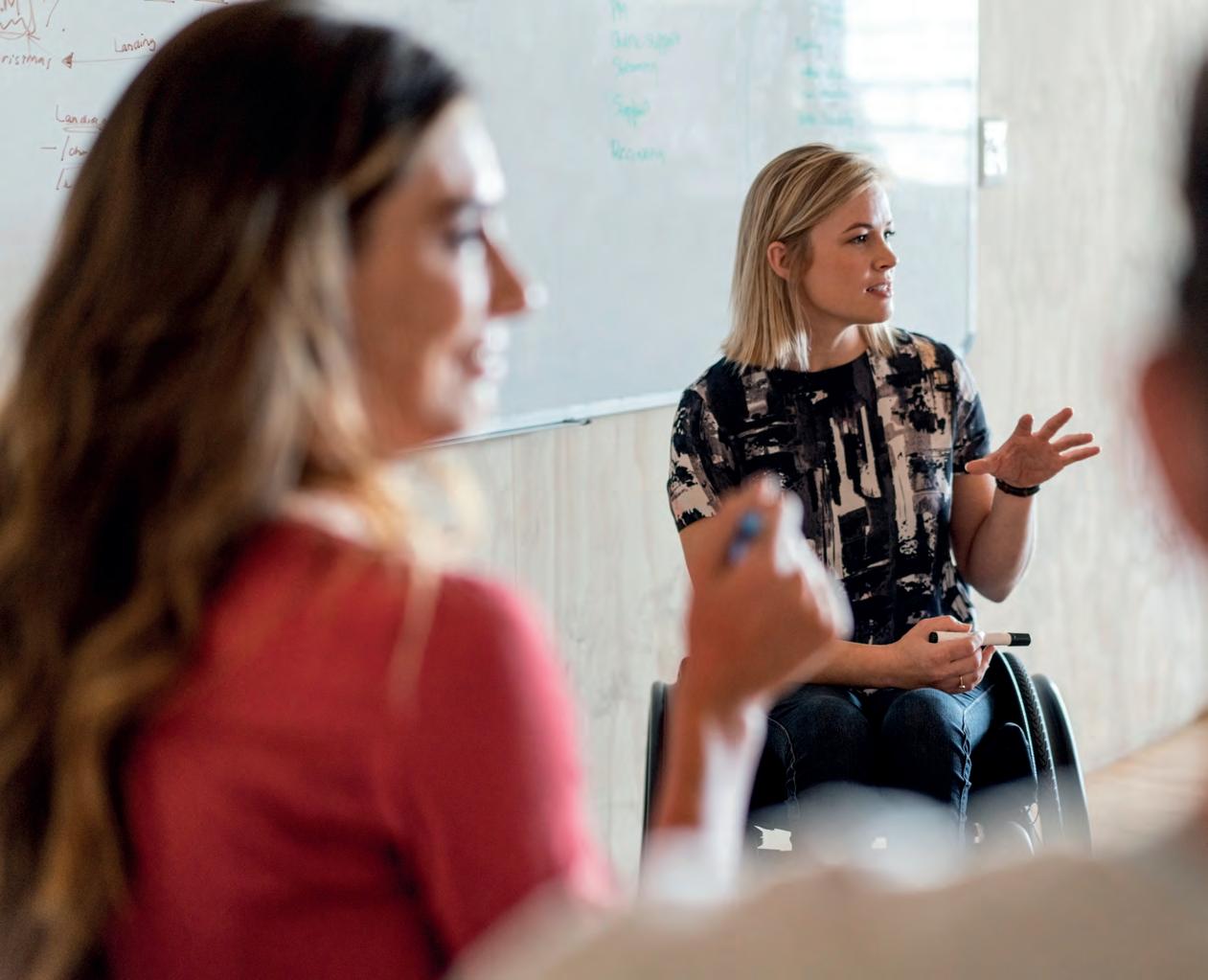
“The number of people with a learning disability in paid employment was incredibly low when we started and I do believe that the work Little Gate has done has helped to improve the percentage locally, but what we’re looking at now with the cost of living crisis is everyone tightening their belts,” shares Andrea. “The reality is some small employers are going to cut the amount of staff that they have, and especially part-time staff, if they’re not busy.
“Quite a few of our adults with a learning disability have got jobs in care, we have people working in the NHS locally, and so we do think and worry
about what’s happening with the labour market.”
These worries could now become a reality and further lower the employment rate for people with a learning disability.
“Nationally, what I’d want to see are changes so that everyone has a supported employment model, then it doesn’t matter what your difference might be, you’ll be able to find stable, paid work whether it’s two hours a week or full-time,” offers Andrea. “To do this, we also need to see the right support for employers across the country because a lot of the time they’re worried and need some help and reassurance.
“There is work happening, but I think more could be done. We’ve got this recruitment crisis where businesses are desperately trying to recruit people and this is one of the answers, this incredible group of talent that we’ve got.”
For Andrea, the continually low employment figures reflect how some
people value disabled people in society.
“People with a learning disability often just get forgotten and don’t get to be part of our communities,” emphasises Andrea. “Your life expectancy is much lower and your access to different services isn’t as good.
“If someone with a learning disability gets a job then it’s transformational for their life: their life expectancy increases, everything improves from their social lives to their ability to do things independently, and at the end of the day this all benefits the economy.”
FOR MORE INFORMATION
Charities including Mencap (www.mencap.org.uk) can offer employment programmes and advice alongside organisations like DFN Project SEARCH (www.dfnprojectsearch.org) and Little Gate (www.littlegate.org.uk)
79enablemagazine.co.uk
enable
WE ENABLE



We’re the Army’s national charity. Every day we’re here for former soldiers like Darren, whose arthritis made it difficult to leave the house. We helped to adapt his garden so Darren could spend more time outdoors.


SEARCH ABF THE SOLDIERS’ CHARITY TO FIND OUT MORE ABF The Soldiers’ Charity is a registered charity in England and Wales (1146420) and Scotland (SC039189) and registered as a company limited by guarantee in England and Wales (07974609).
DARREN ROYAL ENGINEERS
INDEPENDENT LIVING
SETTING EDUCATION EXPECTATIONS
As the government appoints a new Minister for Schools and Childhood, autistic young people are calling for better outcomes
As Kelly Tolhurst entered her first week in parliament as the Minister for Schools and Childhood, members of Ambitious about Autism’s youth network got to work on a new plan. Setting key targets for the UK Government’s education team, the plan explains the outcomes these young people expect them to achieve on behalf of children and young people with special educational needs.
TARGETS
The group, made up of young people between the ages of 16 and 25, created their own version of an Education, Health and Care Plan (EHCP), setting out the goals they would like the new minister and the current Education
Secretary, Kit Malthouse, to meet and fully fund within the next year.
Key targets for the team include: ensuring schools are more inclusive environments for all pupils, including inclusive uniform, attendance and behavioural policies; protecting young people and families’ existing SEND rights and ensuring they’re enforced; requiring all education staff to be trained in autism with the involvement of autistic young people in developing this training; making sure schools can’t get a good or outstanding Ofsted judgement without high-quality SEND support.
“Changes to the special educational needs system will directly impact autistic young people, so Ambitious about Autism’s youth network have set their own targets for the Government’s
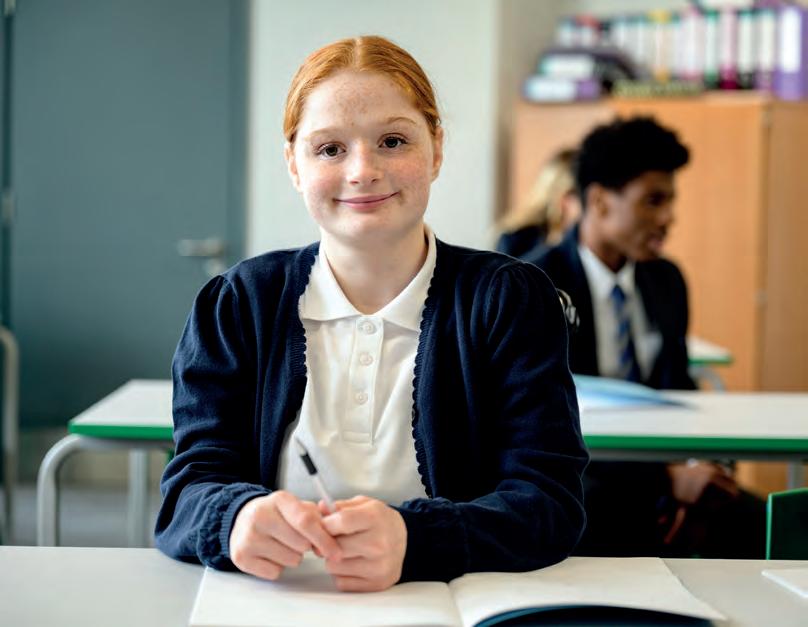
new education team, in the format of an Education, Health and Care Plan,” highlights Jolanta Lasota, chief executive at the charity. “Among their key asks are protecting existing SEND rights, making school more inclusive and better training for school staff on autism.”
OUTCOMES
These calls for better outcomes arrive as the government considers new proposals to overhaul the SEND system, including plans to introduce a set of national standards in legislation. The shake-up could also include changes to the SEND tribunal process and introducing tailored lists of schools for parents to choose from. While there could be positive steps forward, Ambitious about Autism has raised concerns that some of the proposals could weaken young people’s existing rights and protections.
The charity is now calling for two essential documents, the SEND Review and the Schools Bill, to work together more effectively.
“It is a critical time for autistic children and young people with regards to both the Schools Bill and SEND Review, so it is important their views and opinions are taken into account by decision-makers,” emphasises Jolanta. “As the new team at the Department for Education gets to work, we hope they will recognise the concerns of these young people by taking action on the vital proposals they have put forward.”
After calling for better outcomes and achievable targets for autistic children and young people, the youth network and Ambitious about Autism now face a timely wait to see if their targets are met by the UK Government.
To
81enablemagazine.co.uk
enable education
FOR MORE INFORMATION
find out more or to join the youth network, visit www.ambitiousaboutautism.org
SPREADING JOY THIS CHRISTMAS
The chance to read books from a young age can be extremely beneficial, aiding literacy, creativity and emotional wellbeing, but for many vulnerable children and children in care, they can be hard to access. Every year, BookTrust set out to change this with their annual Christmas Appeal. The charity works to remove barriers to reading and has been giving children books at Christmas since 2007.
“We know that when the right support is given it can be truly transformative,” highlights Diana Gerald, chief executive at BookTrust. “The festive season can be a hard time for many people, but 2022 will be an extremely tough year for children from low-income families in the face of economic uncertainty, soaring bills and the cost-of-living crisis, and sadly, any spare money for children’s books simply won’t be there.”
APPEAL
The appeal asks people to donate £10 to send one child a surprise festive parcel. This year, the parcel will include a hardback book, a letter from children’s author Julia Donaldson, a poster designed by illustrator Lydia Monks, and a bookmark.
Working with local authorities, food banks and a network of partners across England, Wales and Northern Ireland, BookTrust hope to distribute 16,000 parcels this year.
“We’re gifting a selection of six beautiful hardback books for this year’s Christmas appeal, with eye-catching covers and a real tactile feel,” reveals Diana. “These books are suitable for different age ranges – from three to 13-years-old - and offer a mixture of fiction, poetry and non-fiction titles by well-loved authors and illustrators.
“It’s important that these books feel extra special, and we’re delighted to be able to offer such a variety of reading
experiences to capture children’s imaginations. We hope they can’t wait to open them up and get lost in what’s inside – and we hope they’ll be proud to call these books their own.”
The titles being gifted this year include The Gruffalo Carousel Book by Julia Donaldson, illustrated by Axel Scheffler; Britannica First Big Book of Why by Sally Symes and Stephanie Warren Drimmer, illustrated by Kate Slater; and It Can’t Be True: Animals by DK.

“BookTrust’s Christmas Appeal is about bringing some joy and excitement to disadvantaged children and children in care, making sure they don’t miss out on the emotional and educational benefits of reading, and helping them find escape and magic in the gift of a good book at a time where they may need it most,” explains Diana.
BENEFITS
The appeal presents more than a special gift at Christmas, it’s an opportunity for disadvantaged and vulnerable children to enjoy the benefits of reading.
“At BookTrust, we witness first-hand how life-changing it can be for a child to develop a love of reading and stories,
and how it benefits their development, sense of self, mental wellbeing and their imagination,” emphasises Diana. “Getting lost with a book or sharing a story with their parent or carer is a powerful, holistic way to support families who need it most.
“To gift these book parcels to the children who need them the most, in order to hopefully inspire a lifelong love of reading is core to what we do and an absolute priority to us. Being able to give them as surprise gifts at Christmas makes it even more special.”
You can donate directly or give a gift on behalf of someone else by visiting www.booktrust.org.uk/ xmas and use #JustOneBook on social media to spread the word.

82 enablemagazine.co.uk
FOR MORE INFORMATION
enable life The appeal helping vulnerable children receive a gi and get reading this Christmas
ILLUSTRATION:
KATE HINDLEY

























26 OCTOBER 2022–1 JANUARY 2023 ROYAL SHAKESPEARE THEATRE STRATFORD-UPON-AVON
Photography by Hugo Glendinning © RSC
The work of the RSC is supported by the Culture Recovery Fund The work of the RSC Literary Department is generously supported by The Drue and H.J. Heinz II Charitable Trust Relaxed Chilled Integrated BSL Captioned Audio described BOOK ASSISTED PERFORMANCES NOW rsc.org.uk














































































































































































































































































































































































































































































































































